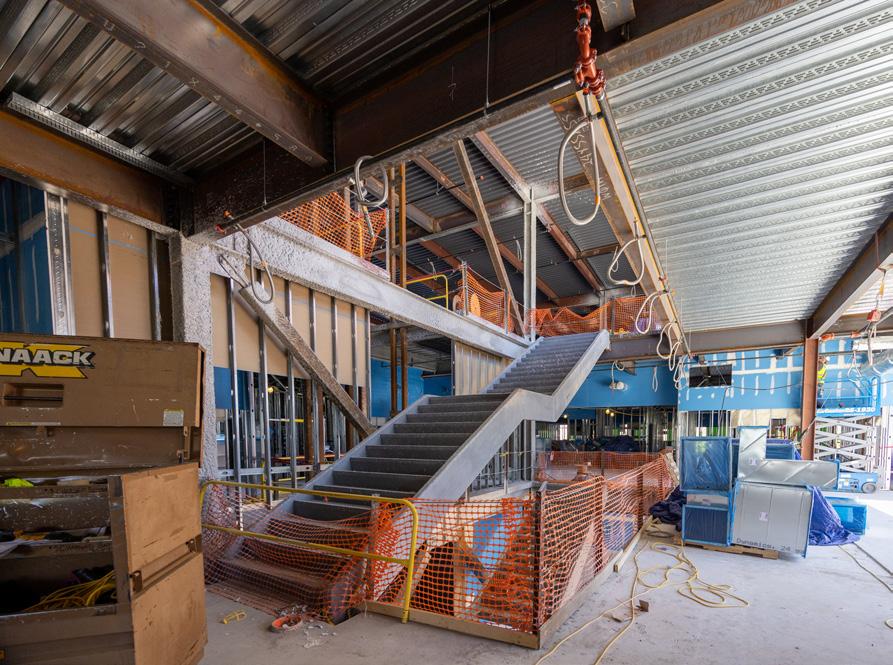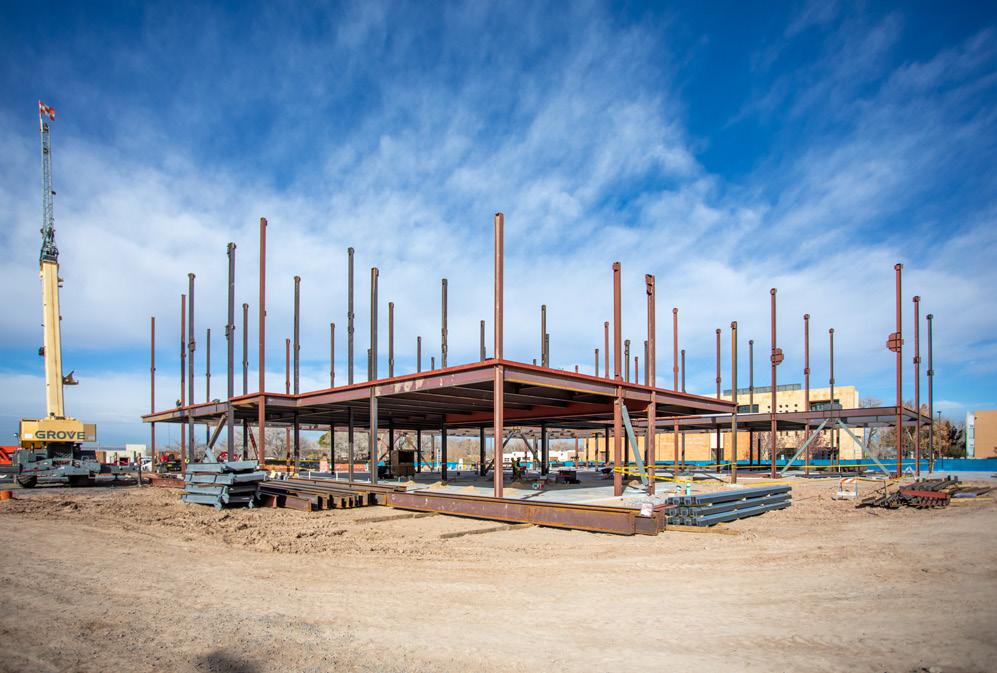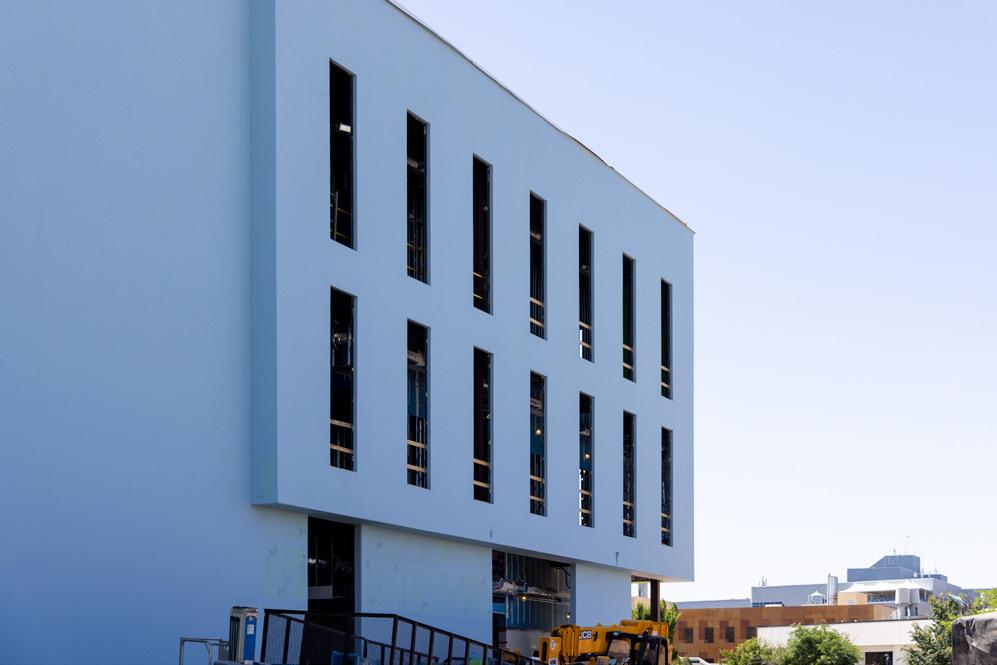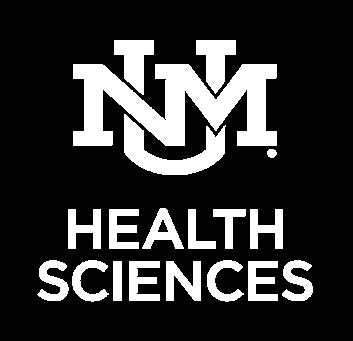UNM NURSE
Advancing the Field of Nursing
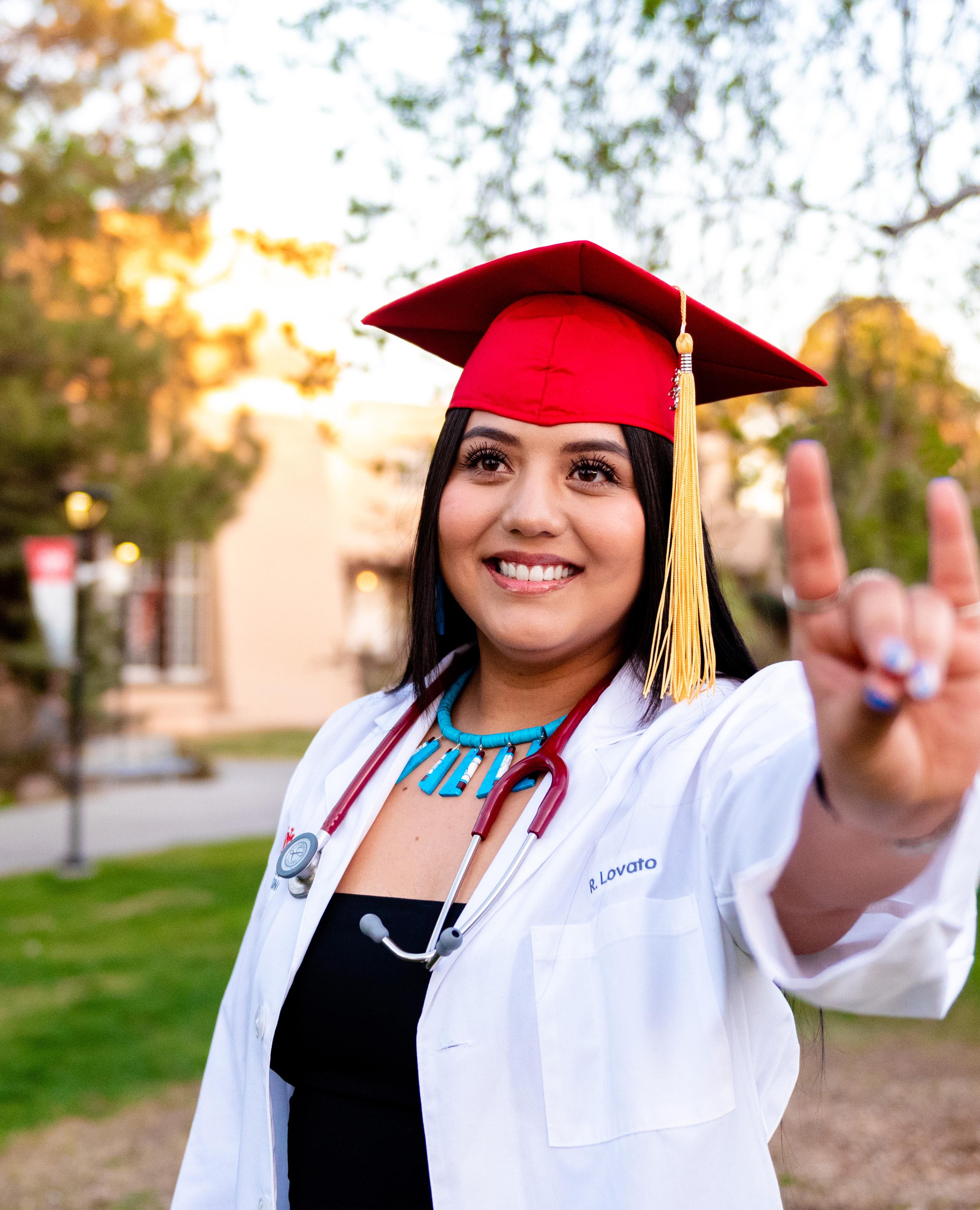


SCHOLARSHIPS PROVIDE THE OPPORTUNITY STUDENTS WOULD NOT OTHERWISE HAVE TO PURSUE THEIR DEGREE IN NURSING. WE RELY ON DONORS TO HELP US SUPPORT THE EDUCATION OF NURSES THAT WILL CONTRIBUTE TO THE FUTURE LANDSCAPE OF NEW MEXICO’S HEALTH CARE.

DONATE TODAY AT, HSC.UNM.EDU/NURSING/DONATE
Let’s discuss naming opportunities and other ways to support the College.
Leslie Fraser | 505-272-9880 | Leslie.Fraser@unmfund.org
Welcome to the 2023 issue of UNM Nurse Magazine: Advancing the Field of Nursing. This year has been filled with a considerable amount of growth and accomplishment for the College of Nursing. From faculty accomplishments and student notoriety to community impact by alumni and our new building rising before our very eyes, the College has a lot to celebrate and reflect on. I always take a chance to recognize the unique qualities of our home: New Mexico, and the great privilege we have to serve as nurses in this magnificent state. I firmly believe the nursing experience here is singular. We are unrivaled in community and drive to help each and every one of the citizens in our diverse state.
That sentiment shines through the stories and information you will read in this year’s issue. In these pages are accounts of how advantageous degree partnerships are bettering New Mexico health care, an alumnae’s courageous career made possible by her UNM nursing degree, how technology is advancing the nursing discipline in unimaginably beneficial ways and much more. This year’s issue continues the precedents of diversity and innovation that our College has built over the past 68 years.
We are a College of students learning cutting-edge technical nursing skills; striving to be the exemplar of rural health care. We are faculty dedicated to advancing the field through a diverse scope of research and practice that directly addresses challenges for New Mexican communities and guiding the next generation of nurses. We are staff thriving, succeeding and celebrating the daily, semester and annual growth of our College’s many influential and far-reaching departments. We are alumni who compose a community of positive influence, tireless work and passion for our patients; past, present and future. We are nursing.
Sincerely,
Carolyn Montoya, PhD, RN, PNP-PC, FAANP, FAAN Professor and Interim Dean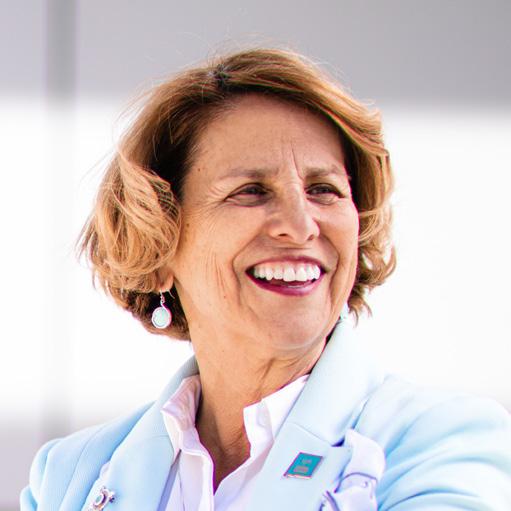
WELCOME MESSAGE

OUR YEAR
PUBLICATIONS, GRANTS & CONTRACTS
PROGRAMS & RANKINGS
EXPANDING TO SERVE OF STUDENTS
HONORS, HIRES & PROMOTIONS
RETIREMENT READY
HONORING THEIR MEMORIES
CLASS NOTES
NOTABLE PROGRESS
ASK INTERIM DEAN MONTOYA
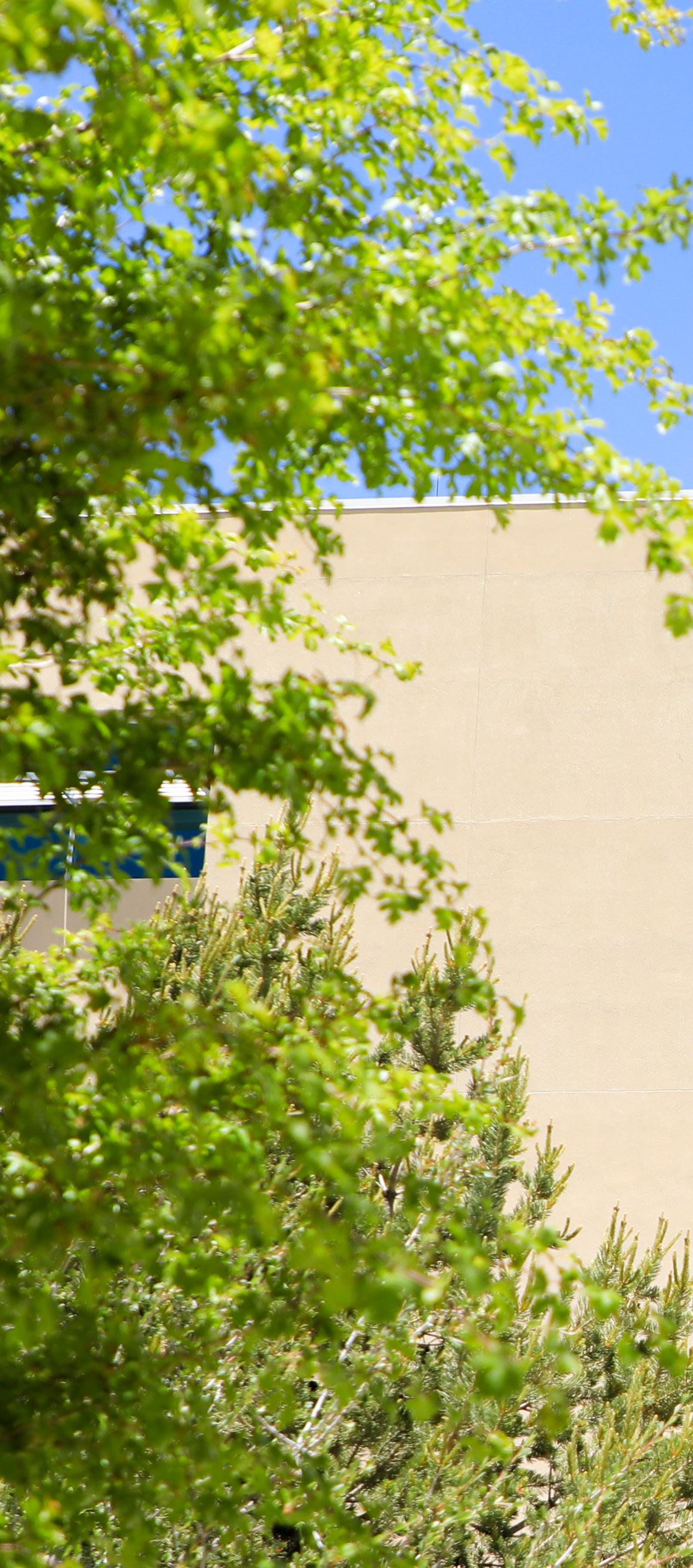
THEORY TO PRACTICE
DUAL DEGREE PROGRAMS
POLICY AND CHANGE
LIFECYCLE OF MENTORSHIP
SPECIALIZING IN PSYCH-MENTAL HEALTH
BROADENING HORIZONS
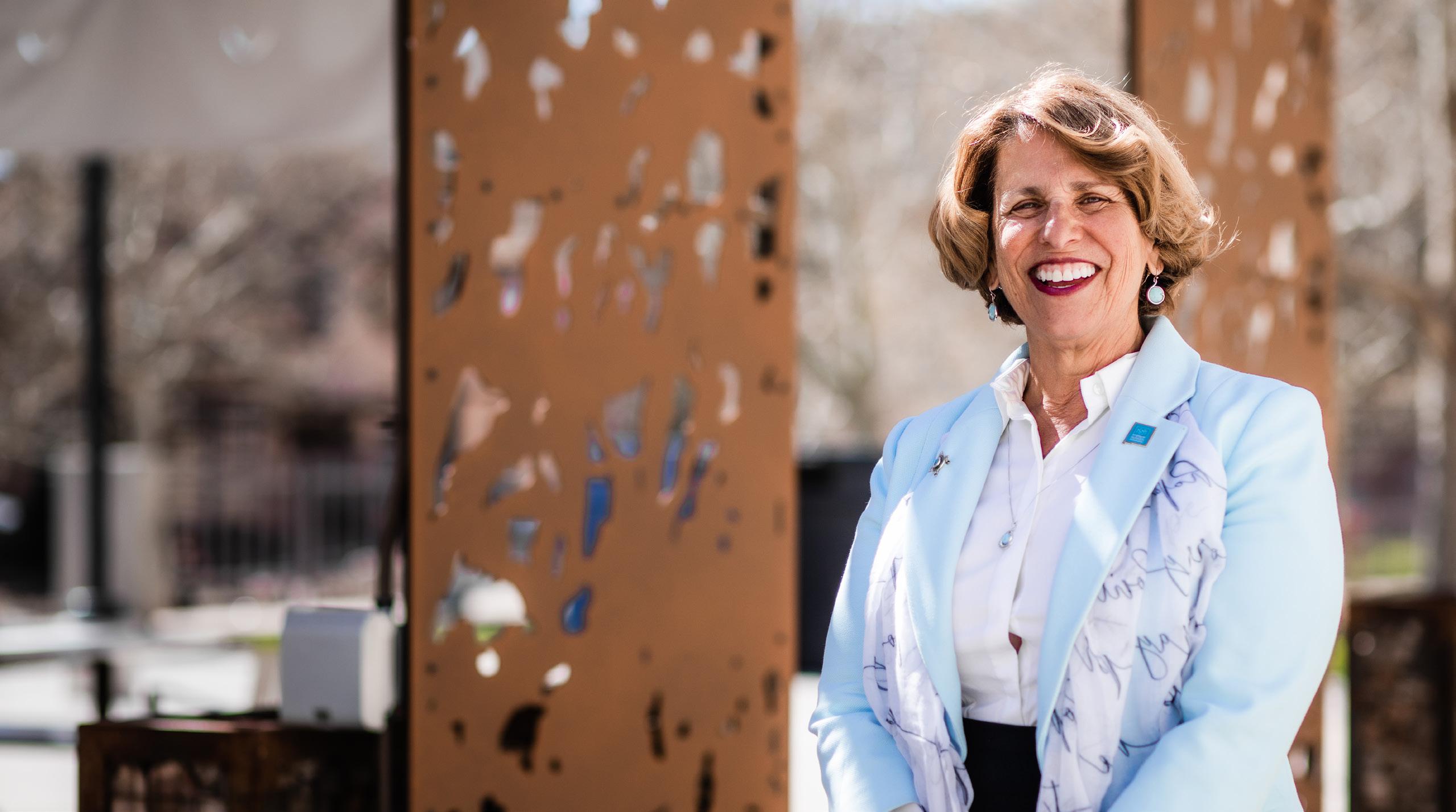
My absolute favorite is being a pediatric nurse practitioner and being in a room with your patients doing well-child care. That’s why I wanted to be a PNP. I wanted to help parents with issues related to babies and children. New family issues: “My baby won’t sleep!” “How can I help my child be healthy?”
I practiced as a PNP here in Albuquerque for 32 years. I actually got to the point where I saw children of the children I cared for. I loved that they wanted me to care for their growing family.
I have always believed that nurse practitioners must have full scope practice. That belief led me to do more within organizations. I’ve been President of the National Association of Pediatric Nurses and the American College of Nurse Practitioners, which has since combined into one group: the American Association of Nurse Practitioners. I was President of the New Mexico Nurse Practitioner Council when we worked hard and got full scope practice. And this year: 2023, marks thirty years of full scope practice. Now, this was not me alone by any means. This was the work by everyone who was going forward for full scope of practice. I then got involved at the national level to promote the same agenda, to talk to people about how we did it here.
I PRACTICED AS A PNP HERE IN ALBUQUERQUE FOR 32 YEARS. I ACTUALLY GOT TO THE POINT WHERE I SAW CHILDREN OF THE CHILDREN I CARED FOR.
I LOVED THAT THEY WANTED ME TO CARE FOR THEIR GROWING FAMILY.
So, you have a hectic and stressful role right now in the College. What inspires you? What keeps you going each day?
We have outstanding faculty and staff. Everyone — overall — works very hard for the same goal. And that is to produce nurses who are excellent clinicians, who are excellent in scholarship and research. And that’s how we change our health status here. Nurses do a lot to improve not just within the hospital but within communities. That’s what sustains me. If someone were to ask, “When you retire, what will you miss the most?” It’s the people. I’m going to miss them the most.
Well, you know, we have a nursing shortage right now. That’s on everybody’s mind. There’s a lot of pressure to increase numbers, and not just at the undergraduate level but also in the advanced practice and midwifery concentrations. We also have a faculty shortage. It makes expansion somewhat difficult but I am working really hard to fill these roles.
As you know, we’re a poor state and many of our students have difficulty paying for tuition and their education. So, I would like to do more with donor relations. I like meeting with donors, telling them the story of the College of Nursing and encouraging them to donate funding for student scholarships.
I hope we have a new dean who understands the state, the people here and has some strong affiliation with working with policymakers. Of course, every state is different. If you’ve been involved in politics in one state; well, you know one state. Therefore, someone with that willingness to understand how we work here and who believes in good communication and shared governance will be important.
Your passion for clinical work is very clear. What drew you to academia?
I was able to obtain my master’s degree at Yale University through the National Health Service Corp. When I graduated I was placed at an underserved clinic in Brownsville, Texas — about ten minutes from the Matamoros, Tamaulipas, Mexico border. This clinic provided me with an amazing clinical opportunity; however, my commitment has always been to New Mexico. When I returned to New Mexico, I started as a College undergraduate faculty in 1983, but my heart was still with clinical practice. So, after five years I went back to practice as a PNP. After that, the College of Nursing kept “pulling” me back to teach pediatrics. I decided to return full-time to the College in 1991, and here is where I have stayed and thrived.
While moving to different academic institutions exposes faculty to different pedagogies and leaderships styles, you can also gain diverse knowledge and insight as long as you stay engaged with other professional communities. I’ve been actively engaged in national organizations that have allowed me to attend several leadership programs. I currently serve as a member of the Policy Committee for the National League for Nursing (NLN) and I am a co-chair for the next diversity conference for the American Association of Colleges of Nursing (AACN). I was very fortunate to serve as a member of the U.S. Health and Human Services Rural Health Committee for four years. Indeed, there are benefits to working and learning at other institutions; however, there are many opportunities to expand your teaching, scholarship, research and leadership through local, state and national organizations. I can’t think of any other career that would have provided me with the satisfaction and joy I’ve had as a nurse, a PNP and a nurse educator here at home in New Mexico.
The first time Quinlyn McBrayer entered The University of New Mexico College of Nursing simulation and skills lab to work with a highfidelity manikin, the experience felt so vivid that she forgot she wasn’t treating a real, live person.
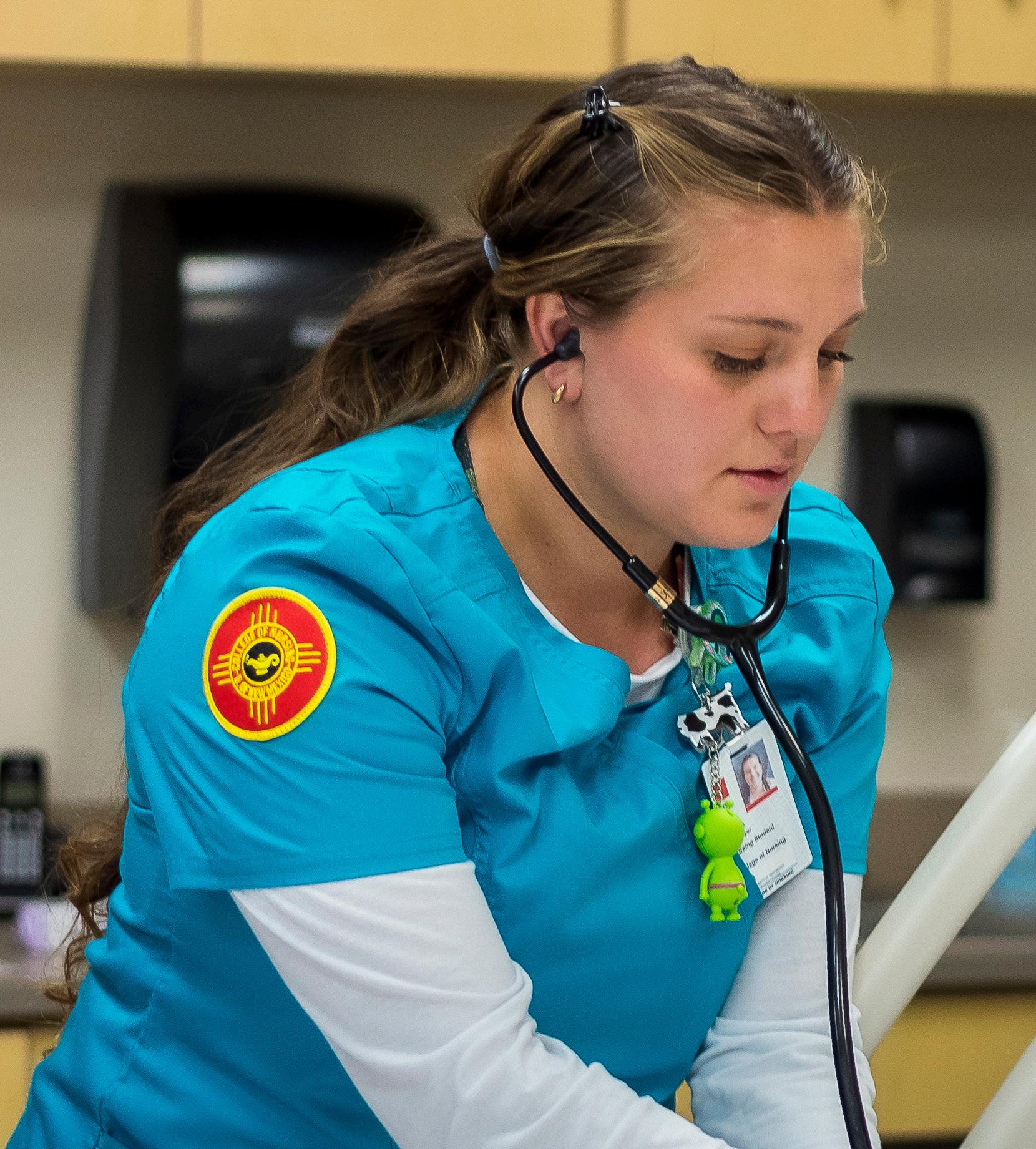
“Because the manikin was speaking back and having a conversation with me, it became real, and I forgot for a second that I was speaking with a manikin,” said McBrayer, who is a level 3 nursing student. “In my head, I was educating this little elderly lady who had chronic kidney disease and was at risk for falls.”
“In a lot of ways, it does become real,” she added. Real-world, hands-on nursing experience without the risk — that’s what simulation and skills labs promises its students, according to Adreanne Cordova, MSN, RN, CNE, faculty and simulation coordinator.
“Our students usually get to fulfill the scope of their training in simulation,” Cordova said. “It’s an opportunity for students to safely get things wrong so they can learn.”
At the bedside, students take turns checking the vitals of manikins – some of which are fully interactive and mimic a real person. Students can
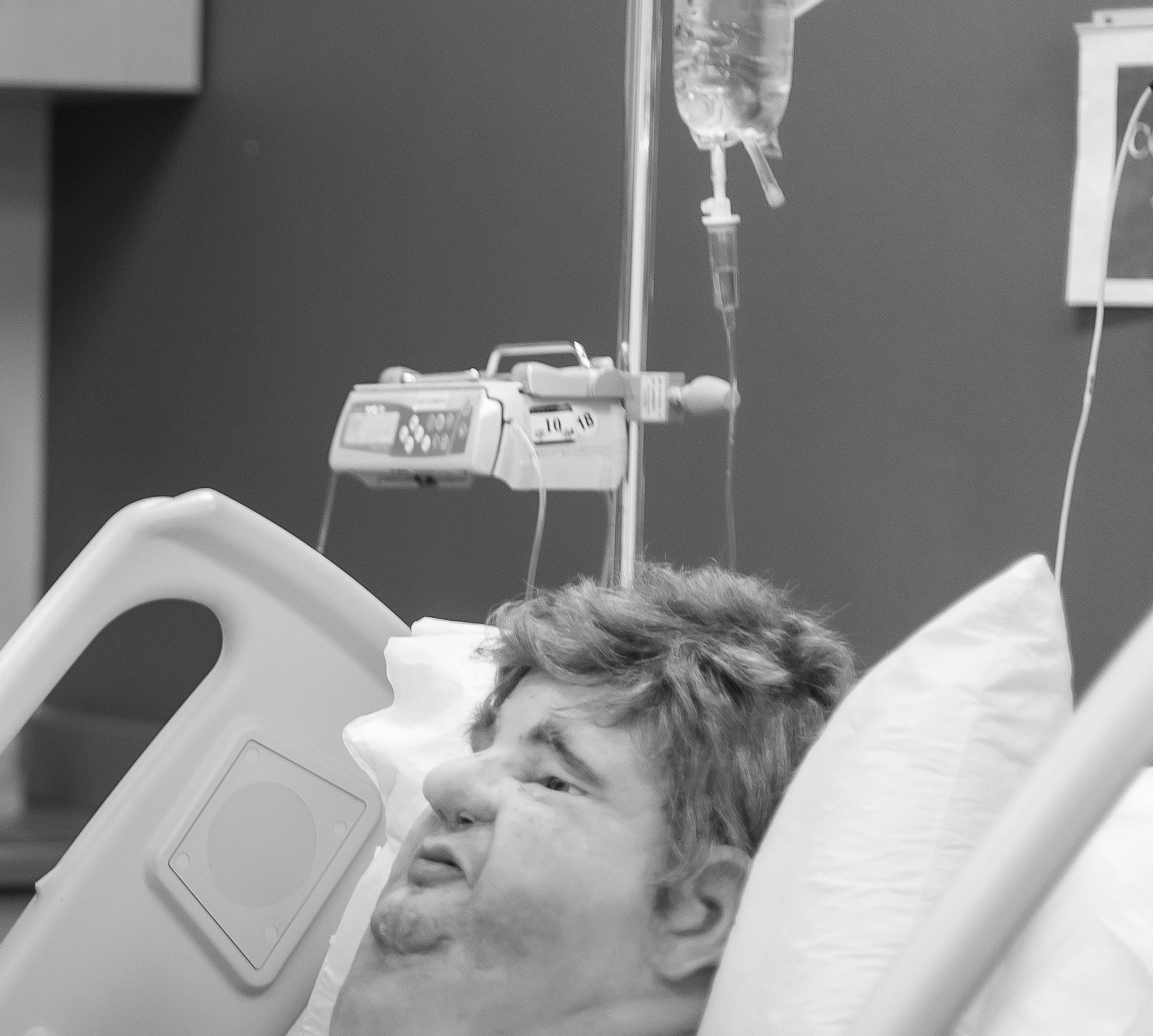
hear manikins’ heartbeats through stethoscopes, check blood pressure, provide wound care and practice IVs, catheters and feeding tubes.
“It’s a very authentic experience for the student,” Cordova said.
“Whether it’s good or bad,” she added after a beat. “The students may have a bit of a bruised ego if they did something not quite correct, but in the end, it’s an opportunity to learn from it.”
The manikins in the lab range in age, gender and ethnicity. Cordova said College of Nursing faculty are also working to include more transgender manikins.
“We want to represent our diverse community and patient population accurately,” she said. “We have started integrating some transgender care, just to really be that point of opportunity for students.”
In the lab, students apply the theoretical knowledge they learned in the classroom in carefully curated and diverse scenarios structured to promote learning.
“It’s taking what we’ve read and putting it into a visual medium where we can actually be low stakes, practicing nurses,” McBrayer said. “It allows us to
not just be looking at a book, but getting eyes on a scenario.”
For McBrayer, the simulation lab provides the confidence she needs before starting in a real hospital room.

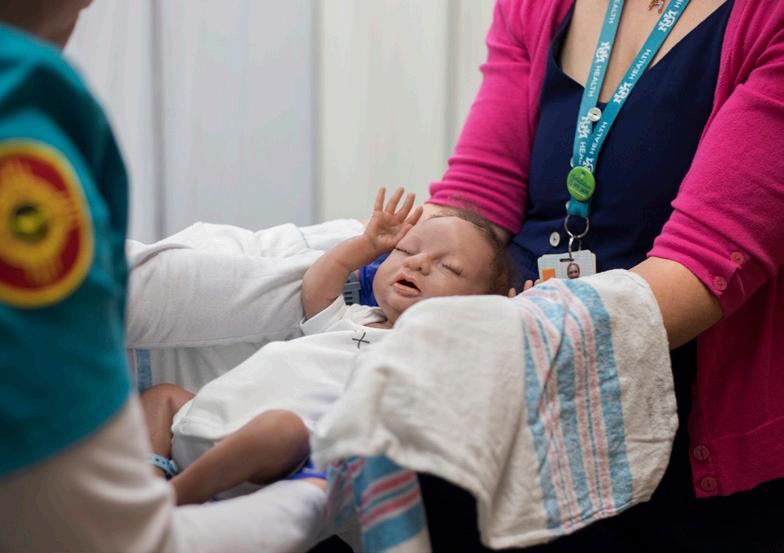
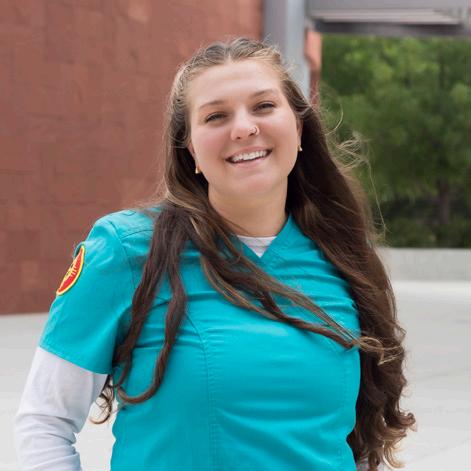
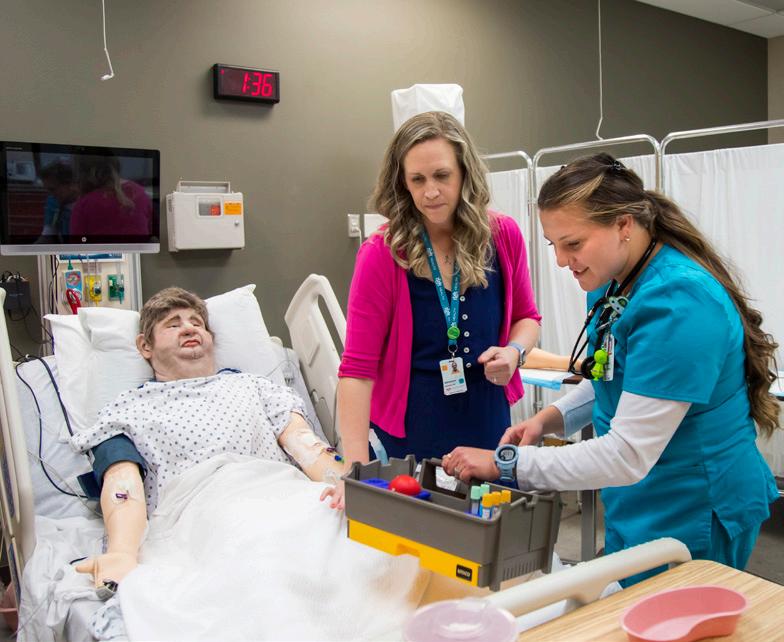
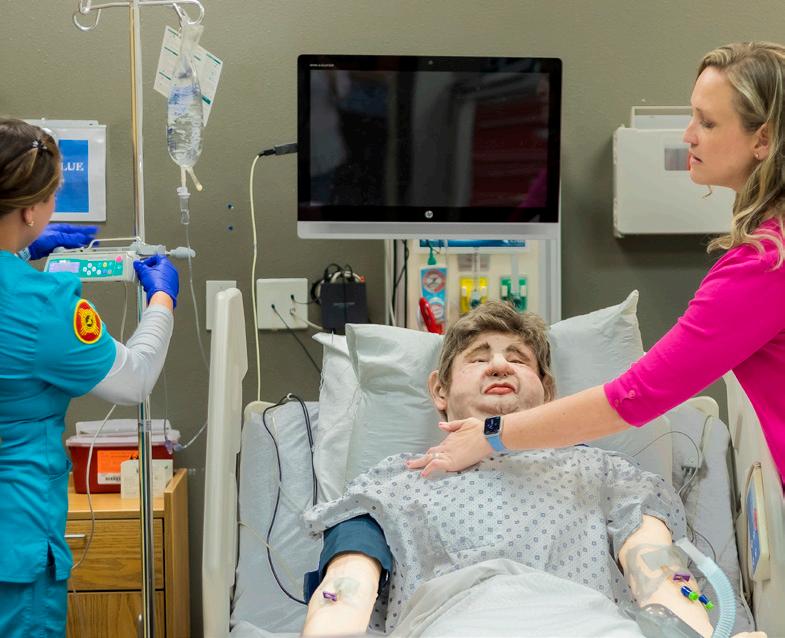
“The simulation lab really allows students to practice those skills prior to going out to our clinicals and attempting on real people,” McBrayer said. “It’s really beneficial to our learning. And it carries through the rest of the clinical experience prior to actually working.”
But sometimes a manikin still might not be enough. The simulation lab also uses live actors, called standardized patients, with whom students can build a human connection. Standardized patients are used in a variety of scenarios, including mental health, care takers for patient manikins and more.
“Having that level of simulation – having actors come in and portray patients – it makes the experience even more real,” McBrayer said.
During simulation labs, College of Nursing staff and faculty monitor the students in a control room behind one-way glass. This is so the students can operate independently.
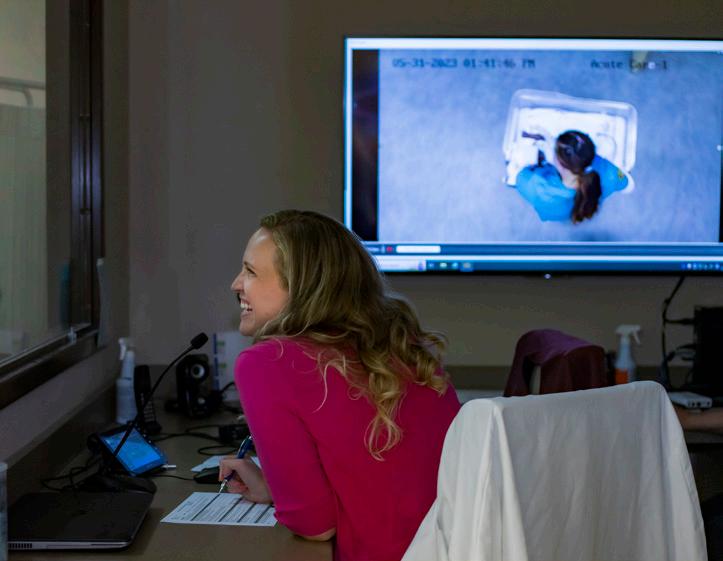
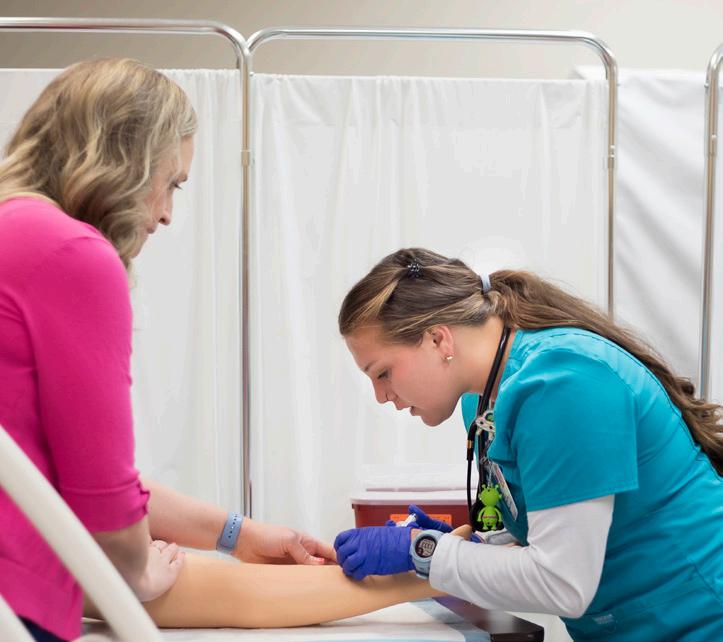
“Faculty are not acting as a coach or a mentor in those moments,” she said. “We want the students to be their own driver of their plan of care and their own communicator with the patient without being prompted by faculty.”
McBrayer said that while the simulations can be somewhat anxiety-inducing, she always looks forward to lab days.
“After every simulation, I breathe a sigh of relief,” she said. “I’ll look at the other students and say, ‘Wow, we did that.’”
“ IT’S TAKING WHAT WE’VE READ AND PUTTING IT INTO A VISUAL MEDIUM WHERE WE CAN ACTUALLY BE LOW STAKES, PRACTICING NURSES. ”
- QUINLYN MCBRAYER
“ THIS PROGRAM HAS BROUGHT A LOT MORE QUALITY EDUCATED NURSES TO OUR HOSPITALS. WE HAVE A LOT OF NURSES WHO ARE FROM HERE (GALLUP) AND KNOW HOW TO TAKE CARE OF THE PEOPLE. ”
SYBIL PIERRE CASILAC
UNM-GALLUP BSN ALUMNI
Family and community are at the forefront of priorities for the University of New Mexico College of Nursing. The College’s Dual Degree BSN program allows not just students but faculty and staff to fulfill their passion for nursing and nursing education while remaining within their communities.
The dual degree program invites admitted students to earn their associates degree in nursing from their local community college or branch campus and bachelor of science in nursing degree from UNM College of
Nursing without having to travel to Albuquerque campus. This innovative program partnership is made possible by the New Mexico Nursing Education Consortium program a collaborative involving nursing programs across the state of New Mexico. This option is multipurpose: it allows students to pursue a higher educational degree while fortifying the health care of New Mexico’s rural populations by educating students who chose to remain in their communities.
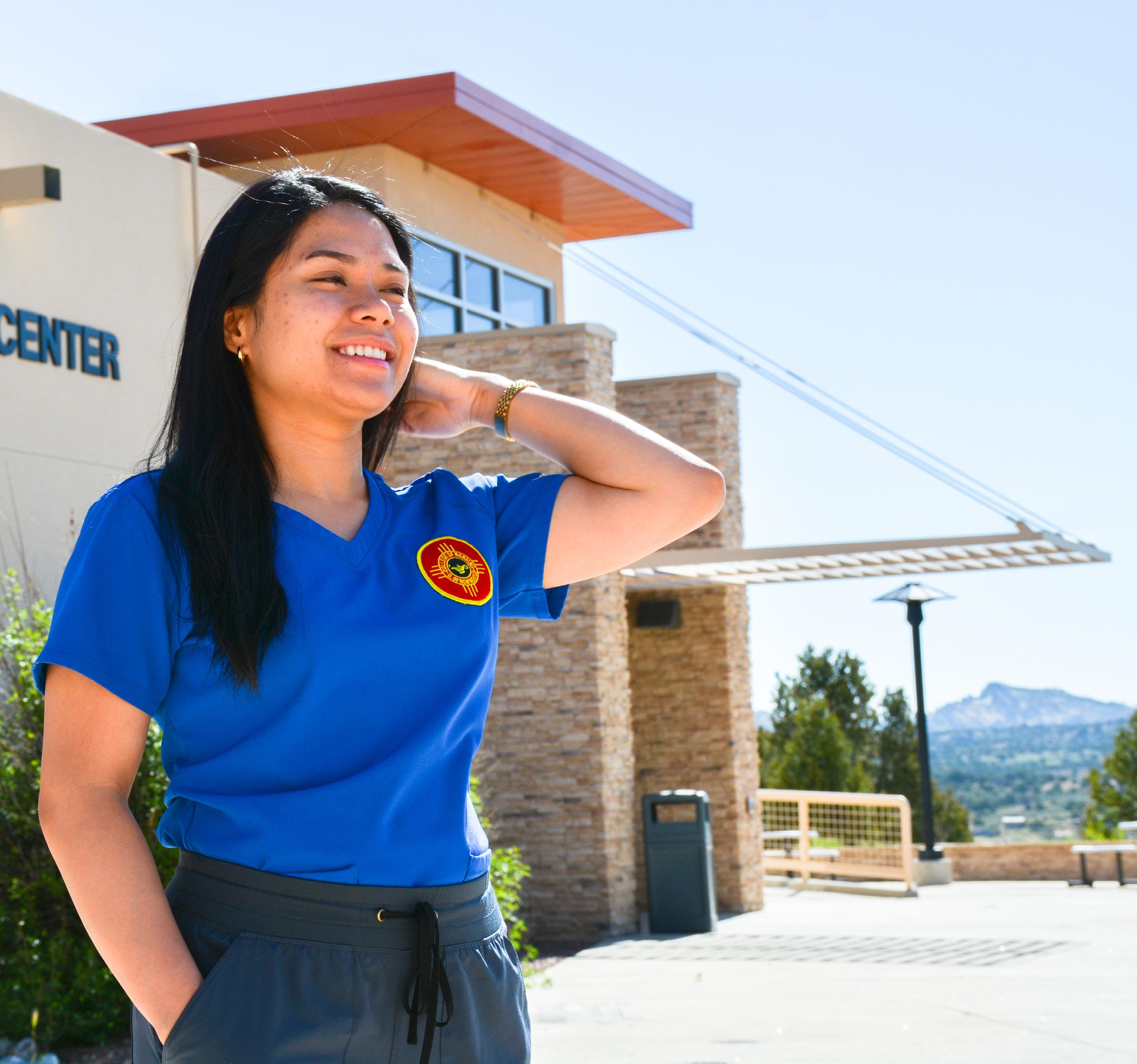
Sybil Pierre Casilac just graduated with a BSN from UNM-Gallup and was enrolled in the dual degree program. Her greatest takeaways? Getting to learn from a prestigious faculty, witness the dual degree program produce nurse leaders who better the health care of Gallup’s populations and being close to her family while earning her degree.
“I was very fortunate the dual degree opened up here in Gallup. I was going to have to leave my family sooner than I wanted to and move to Albuquerque at 18. As immigrants from the Philippines, we wanted to stick together for a little longer. This program let me do that: learn from really compassionate professors and learn advanced material,” Casilac says.
UNM Gallup is one of six locations where the dual degree is offered. Students perform their clinical intensives in intimate cohorts at – for some students - the same clinics, hospitals and practices they grew up seeking care at. It is an aspect unique to a degree program like UNM’s: empowering students with the realization that they can make their home a better, healthier place through nursing.
“This program has brought a lot more quality educated nurses to our hospitals. We have a lot of nurses who are from here (Gallup) and know how to take care of the people. It’s also quite rigorous. The rigor and challenges of the curriculum motivated my cohort to succeed and elevate ourselves. I’m proud of us,” says Casilac.
UNM Gallup’s nursing program is directed by Jonathan Lumibao, MSN. He, an alumnus of UNM’s ADN, BSN and MSN programs, and also an immigrant from the Philippines, finds Gallup to be a charming place and perfectly suited for the dual degree relationship.

“In the Philippines, I grew up in a very densely populated area surrounded by lush greenery. It is beautiful, but sort of the opposite of Gallup. Here I know everyone. I wave to someone while walking through a beautiful landscape that I find inspiring,” says Lumibao.
He continues, “This program gave me so much as a student, and now I can move up the professional ladder. The dual degree nursing program prepares its students for expansive careers. It educates them in a multidisciplinary way with the added quality of showing them how to be a nurse in a small town. And that’s what New Mexico needs.”
The UNM College of Nursing dual degree program is accomplishing all it sets out to do, and more. It is an opportunistic partnership between institutions that allows for the betterment of rural communities, the fortification of future nursing leaders in New Mexico and the ability for those affiliated with the program to remain within the communities they call home.
“
THIS PROGRAM GAVE ME SO MUCH AS A STUDENT, AND NOW I CAN MOVE UP THE PROFESSIONAL LADDER. THE DUAL DEGREE NURSING PROGRAM PREPARES ITS STUDENTS FOR EXPANSIVE CAREERS. ”
- JONATHAN LUMIBAO, MSN, RN, UNM GALLUP’S NURSING PROGRAM DIRECTOR
Mother and son Melissa and Brian Wyaco are both enrolled as students in the College of Nursing. In spring 2024, both will earn a degree; Melissa her DNP and Brian his BSN. The Wyacos are from Zuni Pueblo and share the sentiment that more Native American nursing employees will enhance patient health care for their community. “There was a lack of Native American nursing employees, so that made me want to go back to school and get my nursing degree,” Brian said. “It’s essential because if you (as a nurse) know someone from the community, the patient can let their guard down and provide more information of what’s going on with their health. It’s very touching, and I hope we can inspire others to really look at nursing and other health care professions, and that they can do it regardless of the struggles.” Melissa echoed her son’s desires to encourage other Native Americans to pursue health care careers. “We still need a lot more, because there is such a huge shortage,” Melissa said.
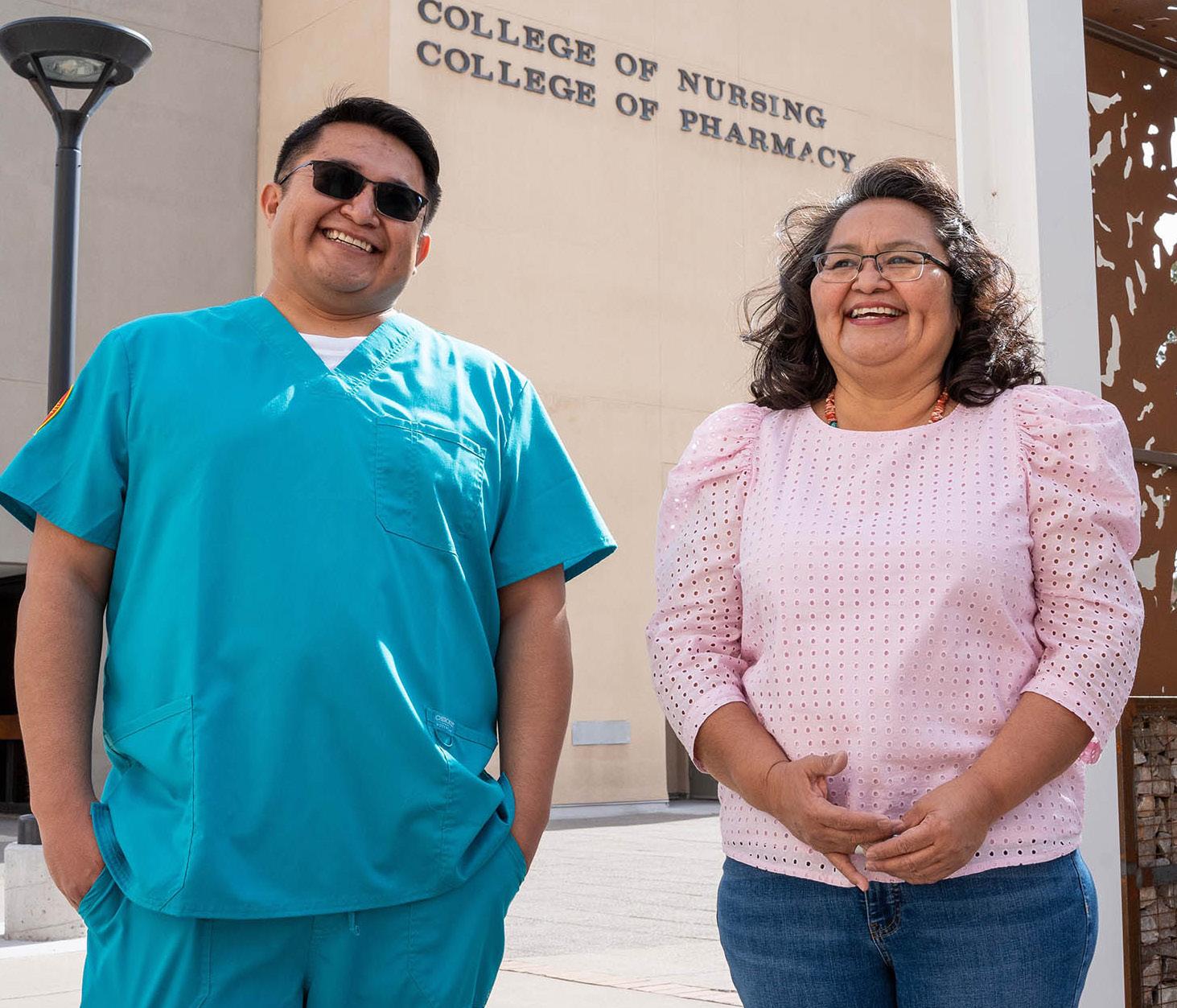
College of Nursing researcher and professor Xiaozhong (John) Yu, PhD, MD, MPH, initiated a partnership with the City of Albuquerque Animal Welfare Department that will have them donate normally discarded animal tissues in an effort to reduce the use of live animal testing. Yu sees the partnership as an opportunity to advance research while also saving animals. The City Council unanimously approved legislation directing the Albuquerque Animal Welfare Department to collect what normally would be discarded and instead donate it to the University of New Mexico Health Sciences Center. The tissue will go specifically toward creating “in-vitro cell culture models as an alternative to lab testing on live animals,” the council states.
The College of Nursing received Kellogg Foundation funding for the UNM Volunteer Birth Companion Program. This program helps provide patients giving birth the support they need during labor. Leading the program is Katie T. Kivlighan, PhD, MS, RN, CNM, assistant professor in the UNM College of Nursing, along with co-directors of the UNM Volunteer Birth Companion Program, Paula Reiss, CD (DONA), and alum Tamara Gardner, MSN, CNM, PMHNP.

“INFLUENCING YOUNGER PEOPLE TO PURSUE HEALTH SCIENCES CAREERS IS GOING TO BE A KEY TO INCREASING OUR PROFESSIONAL SERVICES, ESPECIALLY BEING IN A RURAL AREA LIKE THE RESERVATION.”
- MELISSA WYACO
University of New Mexico College of Nursing students were given the opportunity to learn what intimate partner violence looks like and how to care for patients who are victims of sexual assault.
As part of a guest presentation during a course taught by lecturers Christopher Nelson, MSN, RN, CCRN, PCCN, and Crystal Sanchez, MSN, RN, CCRN, TCRN, guest lecturer Gail Starr, RN, SANE-A, SANE-P, discussed trauma-informed, patient-centered and nonjudgmental health care in cases of intimate partner violence, which includes domestic violence, sexual assault and rape.
“AS A COLLEGE, WE MAKE A CONCENTRATED EFFORT TO EDUCATE OUR NURSING STUDENTS ON THIS VERY IMPORTANT AND OFTEN PERSONAL TOPIC,” SANCHEZ SAID. “WE WORK COLLABORATIVELY WITH OTHER AGENCIES IN ORDER TO BRING STUDENTS THE LATEST EVIDENCEBASED PRACTICE.”
Christina Vigil, MSN-Ed, RN, WCC, OMS, CWCN, undergraduate faculty and Lisa Taylor, DNP, RN, FNPBC, BC-ADM, C-DCES, graduate faculty, were inducted into the Sigma Theta Tau International Honor Society. Seventeen UNM BSN students were also selected to join the international society with the common goals of connectedness, empowerment and leadership for transformative health care.
College of Nursing student Amber Freed has received a prestigious Future Nurse Leader scholarship from the Foundation of National Student Nurses’ Association (FNSNA). A persevering student who has faced obstacles but still kept her nursing goals alive, Freed will use this scholarship to continue in the UNM nursing program with less financial burden.

UNM College of Nursing faculty member Jennifer Schneider, PhD, MA, RN, worked with MolinaCares for a virtual panel exploring how policymakers, health professionals and other stakeholders can work together to meet the behavioral health needs in our state.
Bettering New Mexico’s capacity for serving the mental health needs of it citizens is of the upmost importance. New Mexico has a higher rate of mental health disorders than the national average. Schneider’s involvement lends an impactful hand in increasing awareness for our state’s mental health needs and increasing the number of health care workers so we meet national standards.
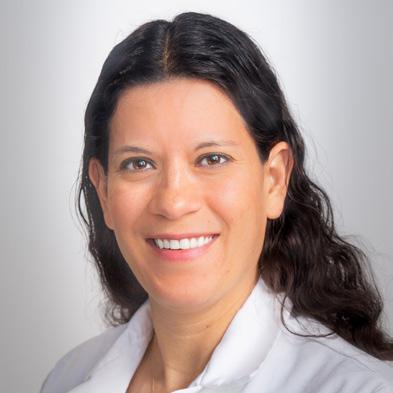

Within the walls of Santa Fe’s Capitol building, an expeditious energy excites change and defense for policies that will shape the immediate future of nursing in New Mexico. UNM College of Nursing Professor Barbara Damron, PhD, MSN, RN, FAAN, and University of New Mexico College of Nursing PhD student Sara Nugent, MSN, RN, entered that environment ready to put in the work as mentor/ expert and mentee/ novice, respectively. By ably navigating the social twists and turns, formalities and ceremony of legislative session, Damron began to show Nugent the ropes of nursing beyond the classroom and clinic; how nursing policy is formulated, changed and/or defended.
Nugent is looking at low value care ordering practices among nurse practitioner populations for her doctoral research. She is concerned with building the body of research validating nurse practitioner competency so that more states grant nurse practitioners full practice authority: authorization for nurses to provide a complete plan of care for patients, from evaluation to treatment to prescribing medications. Her approach is shaping out to be filled with pivotal hands-on experiences. By joining Damron in Santa Fe for the first session of the 56th New Mexico Legislature, she has gained knowledge of policymaking and legislative operations necessary to her developing research.
“Going into the capitol was like stepping back into the 7th grade. I’m getting a doctorate but I said, ‘Oh my goodness,’ it’s a government lesson all over again,” Nugent says.
Her research is a blend of scientific and political research, with careful study and preparedness being paramount to success. To succeed in building a more complete body of data proving nurse practitioner competency for full practice authority, learning to survive and thrive in this atmosphere is essential. Navigating the fast-paced, social world of politics is a lesson she is grateful to have learned, but much more challenging than she anticipated.
“I wouldn’t have been able to do this without Dr. Damron’s mentorship,” Nugent says. Her experience with the New Mexico and Texas state legislatures, as the New Mexico Cabinet Secretary for Higher Education and with federal legislation working both in the U.S. Senate Committee on Health, Education, Labor and Pensions (HELP Committee) and as UNM’s Chief Government Relations Officer, makes her a well-fitting mentor for Nugent.
“She has the same confidence and teaching style on the legislative floor as the classroom. For that I’m grateful. She asked me questions…showed me the importance of building relationships and all around showed me another side of nursing,” Nugent continues.
Whether it be advocating for a bill that will benefit the College in committees or on the legislative floor, networking and building relationships with legislators on the move between meetings, or formulating strategy after hours, Nugent was able to witness Damron do it all.

“The two things I learned most were how to be concise and how to network. Dr. Damron stressed that it’s important to say what you need to say in as few words as possible while still communicating significance. It shows you’re prepared,” she says.
Nugent continues, “Networking can sound superficial and impersonal, so I would say we were building relationships more than anything. It wasn’t just about approaching a legislator and starting a conversation. There was strategic planning on who to talk to from both political sides,” says Nugent.
The reality is, although an individual may enter legislative session with personal beliefs and biases, they must leave that aside to advocate for their institutions and/or affected communities in order to gain bipartisan approval.
“We couldn’t just ally with who we agreed with. Our bills needed bipartisan support because the
patients the bills would help are bipartisan. Nurses serve everyone,” she stresses.
Stepping away from academics and into politics can show a student the importance of being able to not only speak to their craft, but defend it; improve it. This opportunity provided Nugent a unique experience and crucial skills to further her research with the added benefit of practical knowledge for future research endeavors.
Nugent elaborates on those endeavors, “If nurses can wield their full influence and competence without being limited in their practice, health care may be more cost effective. This would help rural or underserved communities.”
To enact these objectives, Nugent will rely on the skills she has learned from her and Damron’s time in the capitol together. Being able to evaluate diverse perspectives, prepare to defend policies that benefit specific communities and having the privilege to see beyond the typical horizons of nursing will come to serve Nugent and her influential research greatly.
Nugent concludes, “Dr. Damron brings out the best in people, and I got to see it in action. Because of Damron, her prolonged mentorship on policy this past year and the time in Santa Fe, I know how to do what I need to do. I will definitely use these skills in the future, wherever I go.”
“ [DR. DAMRON] HAS THE SAME CONFIDENCE AND TEACHING STYLE ON THE LEGISLATIVE FLOOR AS THE CLASSROOM. FOR THAT I’M GRATEFUL. ”
- SARA NUGENT, MSN, RN, UNM COLLEGE OF NURSING PHD STUDENT
The lifecycle of a mentor encompasses many roles, opportunities and surprises. Although the cycle may seem linear in its phases; the reality is that the phases take on a multidimensional nature. Perhaps as a mentee you gain experiences and learn things you never imagined you would. Or, as a mentor, you end up learning just as much — if not more — than when you were a student. This, and so much more, is possible in the lifecycle of mentorship.
Nursing — such a human discipline — would be nothing without the relationships and trust forged through teaching, learning and collaborative growth. Slany Shine, BSN, RN, PCCN, has seen her own lifecycle of mentorship come full-circle. From student to unit-based educator to administrator, Shine has learned through trial and error, taught new nurses how to be leaders and now takes the managerial reigns as RN supervisor of staffing at UNM Hospital. Her career has shown her that being a mentor means you are committed to being a lifelong learner.
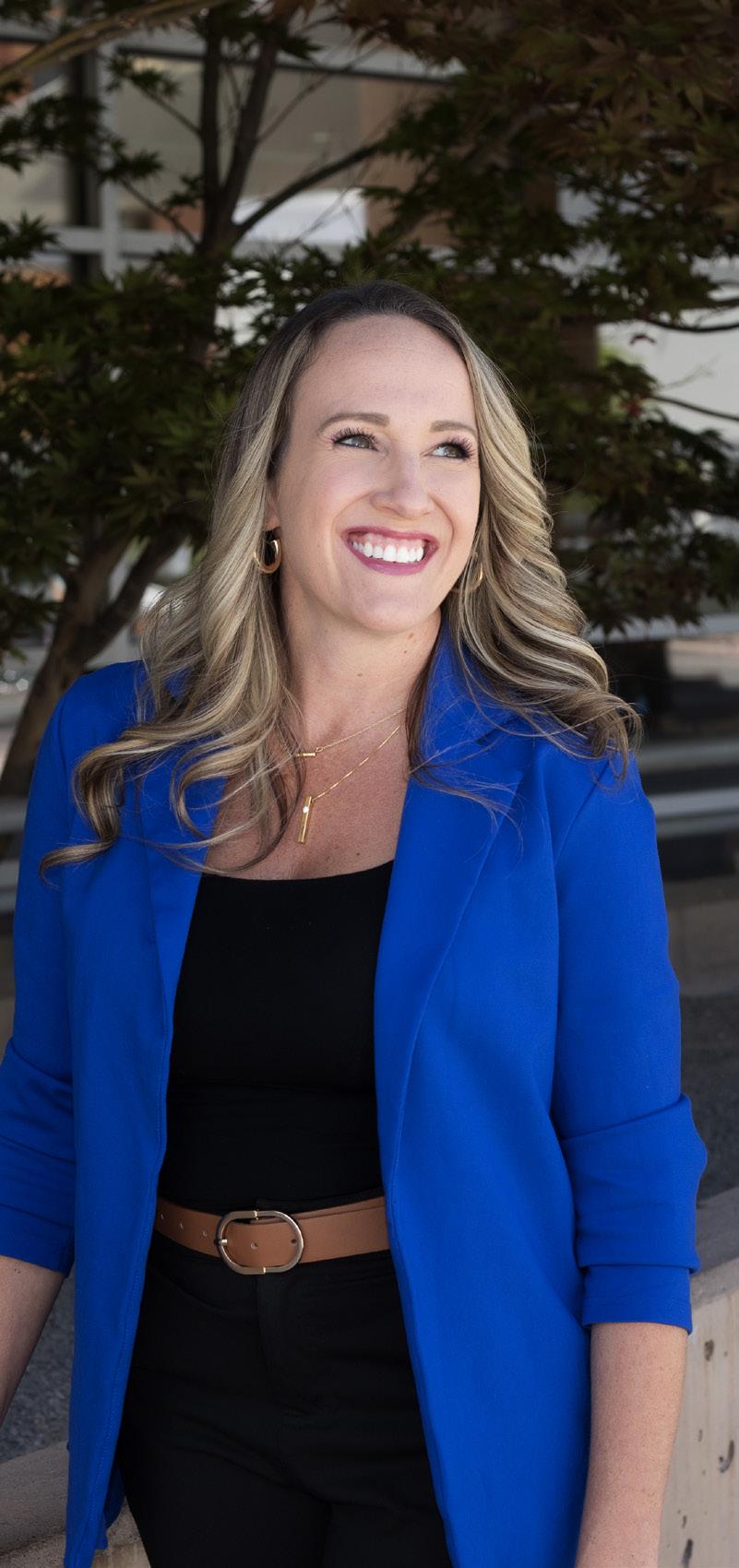
- SLANY SHINE, BSN, RN, PCCN, UNM COLLEGE OF NURSING ALUMNI
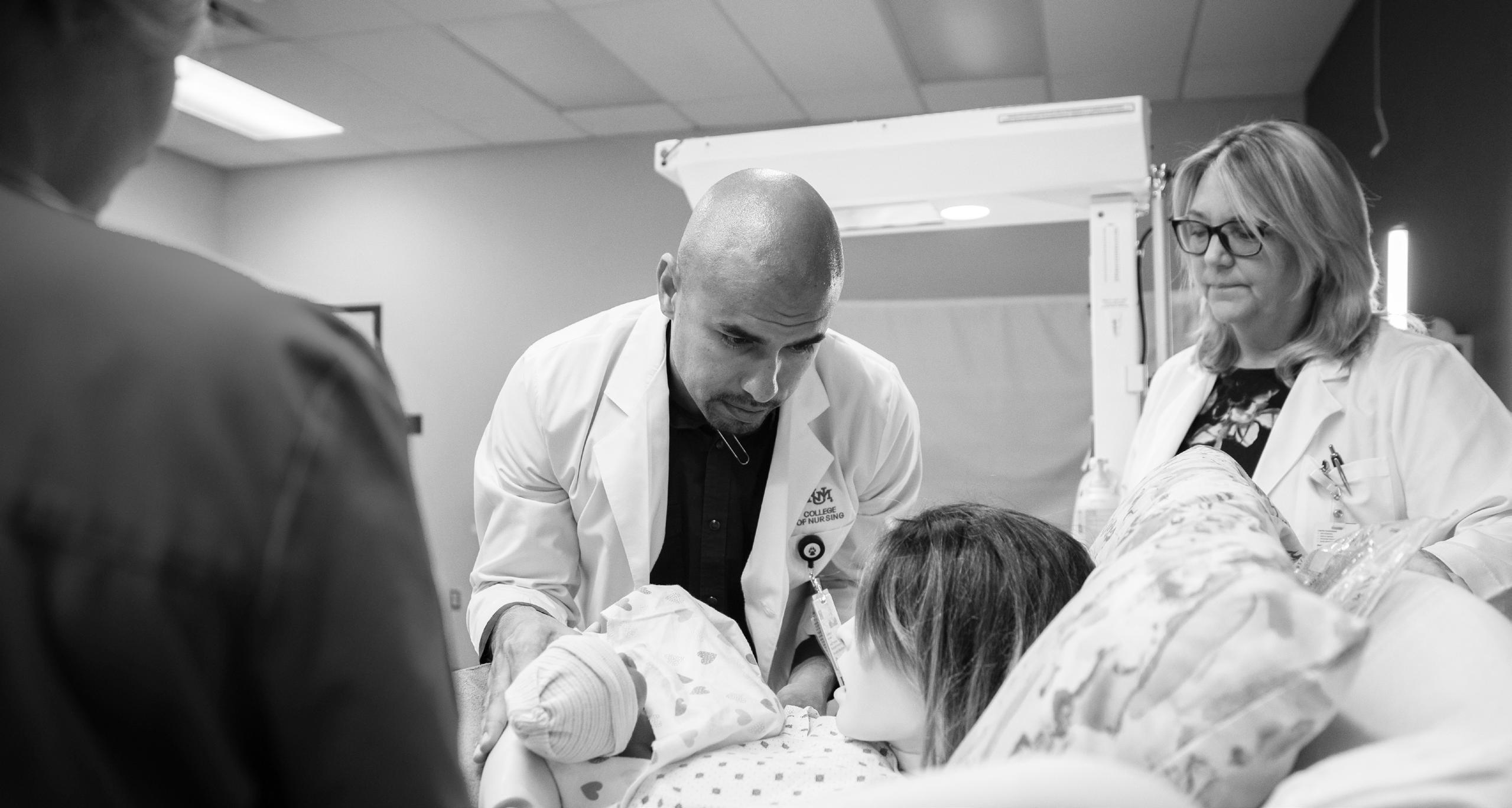
“A MENTOR’S NUMBER ONE JOBS IS TO BE CONFIDENT, BUT HUMBLE. LET YOUR STUDENTS KNOW YOU DON’T KNOW EVERYTHING, BUT THAT YOU KNOW WHERE TO FIND THE ANSWER.”
When you are a nursing student, there are numerous procedural tasks that require skill and practice. But for every physical skill a nurse needs, they need an array of social and emotional ones.
“Nurses need a variety of mentors so they can see how different people nurse. How different people teach. Thankfully, there’s more than one way to nurse.” Shine says.
Having a diverse set of mentors prepares nurses in this phase of the cycle to see the complex social-emotional – humancomponent to nursing.
Shine says, “When I was a student I saw effective preceptorship, mentors willing to teach through humility and compassion and you think, ‘That’s it. That’s a right way to do it.’”
The mentee phase holds more than expected for both nursing students and their teachers. For if a mentor commits to the nature of lifelong learning inherent to nursing, they might be pleasantly surprised to find themselves in the mentee seat every now and then.
In her current role as RN supervisor of staffing at UNM Hospital, Shine uses her own previous experiences to make the position unique to her. As she manages schedules, organizes teams and addresses staffing concerns, she is utilizing skills from each stage of mentorship.
“I’ve been a student, I’ve worked as a nurse and I’ve been a mentor. I know how to accommodate the needs of each role independently and try by best to create an atmosphere that accommodates them all together. When I encounter something new, I enjoy it. Because I feel like a student again. In nursing, the learning never stops.”
As she said goodbye to the student/ novice nurse role, Shine stepped into being a unit-based educator, where she learned that - oftentimes - being a good leader means knowing when to say, “I don’t know.”
“A mentor’s number one jobs is to be confident, but humble. Let your students know you don’t know everything, but that you know where to find the answer,” Shine says. “Advancement would never happen if we already knew everything. Not knowing is how we grow. As a UBE, I assured my students collaboration and curiosity would help them find solutions.”
When the time came to advance her career, Shine experienced the bittersweet process of training her replacement.
“I knew it was my time to leave when I was hesitant of new ideas. I began to think, ‘That may not work,’ more often than, ‘Let’s give that a try.’ I looked at my prospective replacements and offered the position to the nurse who asked questions as often as he answered them. I looked for someone who I could trust to make the position their own.”
A sure mark of an effective mentor is to not expect students to be replicas of themselves, but rather helps their mentees capitalize on their own unique qualities, skills and talents.
“Passing the torch is difficult, but so satisfying. You get to witness that each new role is charged by the experiences of the previous one. No learning experience is isolated or stands alone,” says Shine.
THE UNM COLLEGE OF NURSING WAS 1 OF 52 SCHOOLS IN 31 STATES TO BE INCLUDED IN THE AMERICAN ASSOCIATION COLLEGES OF NURSING CULTURE AND CLIMATE SURVEY - LEADING ACROSS MULTIDIMENSIONAL PERSPECTIVES (LAMP©).
The survey was used to assess learning environments in schools of nursing from the student, faculty and staff perspective. Thus, giving administrators opportunities to improve nursing programs to support a more diverse and inclusive culture and climate. The survey took place in the Fall of 2022 and Interim Dean Carolyn Montoya reported on the findings in Fall 2023.
The goal now is to equip educators with with valuable information needed to initiate change, target areas of growth, and most importantly, improve student outcomes.
Preparing nurses for the future of New Mexico’s Mental Health Care

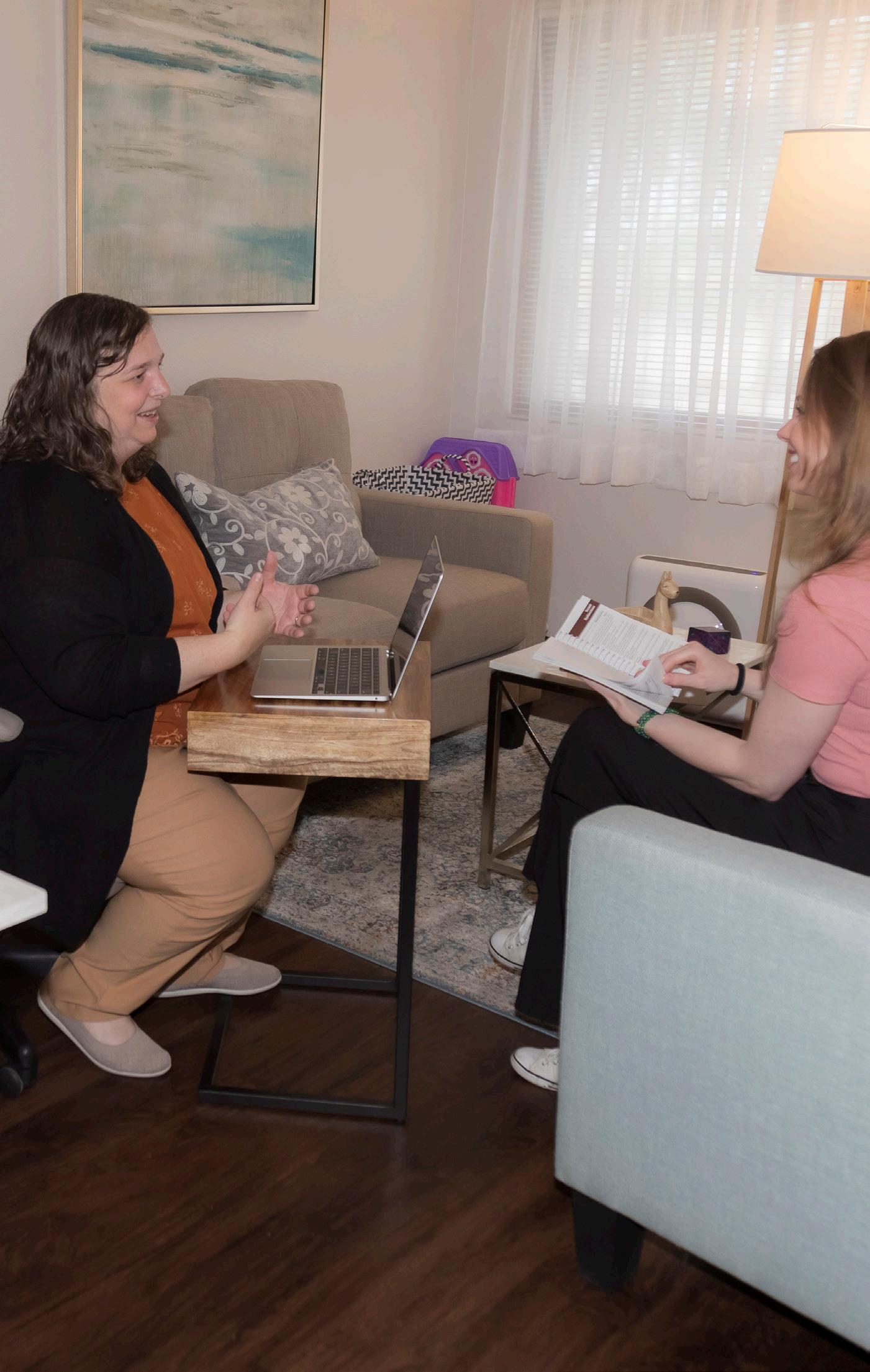
The University of New Mexico College of Nursing’s Psychiatric Mental Health Nurse Practitioner (PMHNP) graduate program prepares students to improve New Mexicans’ mental health. With a specialty, hybrid program with content offered both online and in-person, UNM’s PMHNP curriculum focuses on safe practices, building patient trust, evaluating complex diagnoses and addressing the unique mental health concerns of New Mexico communities.
Jennifer Schneider, PhD, PMHMP-BC, is the program’s coordinator. From her vantage point, she is able to observe the strengths of the program and the unique dynamic of each student cohort.
“The main strength of this program is in our teaching. We have been very thoughtful in constructing the content and courses so that the hybrid platform best serves our diverse students,” Schneider comments.
Each student cohort is comprised of postbaccalaureate students entering directly into the PMHNP specialty and seasoned advanced practice nurses (APNs) looking to advance their career. This makes for cohorts who share varied perspectives during collaborative modules and teamwork in clinical settings. Many of the students with bachelor’s in nursing work as psychiatric nurses prior to starting the PMHNP program. This experience gives them prior knowledge of mental health disorders, treatment plans and psychiatric medications. Those who are already APNs and are returning for an additional certification bring hands-on experience prescribing medications and addressing complex cases. Each individual in the cohort is strengthened by the multiple skillsets found in the overall group.
“There’s a duality to our program that really helps our students become better specialized nurse practitioners. We prepare students to be board certified: do you know how to practice safely? What are the risks of the medications you’re prescribing? They have to know their basics. Then we prepare students for clinical practice focusing
on building good relationships with patients. Does your patient trust you? As psychiatric specialists we often have very complex patients in clinical practice. Students must be able to diagnose and treat these complex patients,” says Schneider.
She continues, “Mental health is a concern everywhere, but particularly in New Mexico. We have high rates of mental illness, substance use and poverty that causes stress and exacerbates mental disorders. Combined with a shortage of nurses and psychiatric providers, we (UNM College of Nursing) are an ideal place to have a program like this.”
The challenges of mental health care in New Mexico provide the need and the opportunity that necessitates the UNM College of Nursing PMHNP program. Its distinctly preparatory nature is attuned to the demands of our communities with courses in health care policy, disease prevention and psychopharmacology across the lifespan, and advanced practicums that allow students to practice clinical skills for rural and underserved populations. Along with a hybrid platform, the PMHNP program is student and patient-focused, with leadership, administration and faculty dedicated to improving the mental health care and over all mental health of the state.
- JENNIFER RN, PMHNP-BC, PMHNP PROGRAM COORDINATOR AND CLINICIAN EDUCATOR, ASSISTANT PROFESSOR“ THE MAIN STRENGTH OF THIS PROGRAM IS IN OUR TEACHING. WE HAVE BEEN VERY THOUGHTFUL IN CONSTRUCTING THE CONTENT AND COURSES SO THAT THE HYBRID PLATFORM BEST SERVES OUR DIVERSE STUDENTS. ”
SCHNEIDER, PHD, MA,

ALSAMAH, W., ACKER, K., FRITCH, R. (2022). DELAYED ANTIBIOTIC PRESCRIPTIONS IN A PRIMARY CARE CLINIC (VOL. 1). RESEARCH SQUARE. HTTPS://DOI.ORG/10.21203/ RS.3.RS-1766591/V1.
BLIZZARD, H. L. (2022). UNFINISHED NURSING CARE: A WARNING SIGN FOR OUR PROFESSION. NEW MEXICO NURSE, 67(4), 1,6.
EL HAYEK, ELIANE., CASTILLO, E., IN, J. G., GARCIA, M., CERRATO, J., BREARLEY, A., GONZALEZ-ESTRELLA, J., HERBERT, G., BLESKE, B., BENAVIDEZ, A., HSIAO, H., YIN, L., CAMPEN, M. J., YU, X. (2023). PHOTOAGING OF POLYSTYRENE MICROSPHERES CAUSES OXIDATIVE ALTERATIONS TO SURFACE PHYSICOCHEMISTRY AND ENHANCES AIRWAY EPITHELIAL TOXICITY. TOXICOLOGICAL SCIENCES.
FINNELL, D. S., SCHIMMELS, J., & TIERNEY, M. (2023). ENHANCING ENGAGEMENT BETWEEN LEGISLATORS AND NURSING TO INCREASE BUPRENORPHINE ACCESS. NURSING OUTLOOK, 71(4), 102004. HTTPS://DOI. ORG/10.1016/J.OUTLOOK.2023.102004.
FOSTER, S., POMERANTZ, A., BELL, K., CARVALLO, M., LEE, J., LEE, J. (2022). VICTIMS OF VIRILITY: HONOR ENDORSEMENT AND MEN’S USE OF ERECTILE DYSFUNCTION MEDICATION. PSYCHOLOGY OF MEN & MASCULINITIES, 23(1), 47-58.
HERNANDEZ, S., DUKES, S., HOWARTH, V., NIPPER, J., LAZARUS, M. (2022). EXAMINATION OF MILITARY STUDENT AND FACULTY OPINIONS AND OUTCOMES OF TWO RAPID COURSE CONVERSIONS TO THE ONLINE ENVIRONMENT: A CASE STUDY AT THE UNITED STATES AIR FORCE SCHOOL OF AEROSPACE MEDICINE. AMERICAN JOURNAL OF DISTANCE EDUCATION, 36(4), 318-326.
HONG, X., SHAO, N., YIN, L., LI, C., TAO, G., SUN, Y., QIAN, K., YANG, J., XIAO, P., YU, X., ZHOU, Z. (2022). EXPOSURE TO ZINC OXIDE NANOPARTICLES AFFECTS TESTICULAR STRUCTURE, REPRODUCTIVE DEVELOPMENT AND SPERMATOGENESIS IN PARENTAL AND OFFSPRING MALE RATS. ANNALS OF TRANSLATIONAL MEDICINE, 10(13).
HU, C., HSIAO, Z. H., YIN, L., YU, X. (2023). THE ROLE OF SMALL GTPASES IN BISPHENOL AF-INDUCED MULTINUCLEATION IN COMPARISON WITH DIBUTYL PHTHALATE IN THE MALE GERM CELLS. TOXICOLOGICAL SCIENCES, 192(1), 43-58.
KELLEY, P. A. W. (2022). CARE FOR THE CAREGIVER IS ONE THE MOST OVERLOOKED PRESSING NEED OF TODAY ALEXANDRIA, VA: NAVY SAFE HARBOR FOUNDATION. 1.
KELLEY, P.W. (2022). CARING FOR THE CAREGIVIERS: THOUGHTS FROM THE BOARD. NAVY SAFE HARBOR FOUNDATIN SITREP, 10 (9), 1.
KIVLIGHAN, K. T., GARDNER, T., MURPHY, C., REISS, P., GRIFFIN, C., MIGLIACCIO, L. (2022). GROUNDED IN COMMUNITY: DEVELOPMENT OF AN INNOVATIVE, BIRTHJUSTICE FOCUSED VOLUNTEER BIRTH COMPANION PROGRAM. JOURNAL OF MIDWIFERY AND WOMEN’S HEALTH, 67(6), 740-745.
LANDEN, J., HERNANDEZ, S. (2022). THE NURSING BACCALAUREATE DUAL ENROLLMENT MODEL: OUTCOMES FOR A COMMUNITY COLLEGE AND UNIVERSITY PARTNERSHIP. NURSING ADMINISTRATION QUARTERLY, 46(3), 224-233.
LAVIN, R., COUIG, M.P., KELLY, P.W., SHWARTZ, T., & RAMOS, F. (2023). HEALTHCARE IMPACTS ASSOCIATED WITH FEDERALLY DECLARED DISASTER-HURRICANES GUSTAVE AND IKE. INTERNATIONAL JOURNAL OF ENVIORNMENTAL RESEARCH AND PUBLIC HEALTH, 20, 1-18. DOI.ORG/10.3390/IJERPH20075388.
LAVIN, R. P. (2022). PLANETARY HEALTH. COURSERA.
LAVIN, R. P., MANGANO, L., VEENEMA, T., COBB, S. (2022). CHAPTER 9: PREPAREDNESS AND RESPONSE TO RADIOLOGICAL EMERGENCIES. PREPARING NURSES FOR DISASTER MANAGEMENT: A GLOBAL APPROACH. ELSIVIER.
LEHNA, C., TWYMAN, S., FAHEY, E., COTY, M. B., WILLIAMS, J., SCRIVENER, D., WISHNIA, G. “WORRIED ABOUT THEM WHEN WE LEFT”: A MIXED-METHODS ESSAY. THE QUALITATIVE REPORT. HTTP://DX.DOI. ORG/10.46743/2160-3715/2015.2095.
LI, Y., LI, X., COURNOYER, P., CHOUDHURI, S., YU, X., GUO, L., CHEN, S. (2023). CANNABIDIOL-INDUCED TRANSCRIPTOMIC CHANGES AND CELLULAR SENESCENCE IN HUMAN SERTOLI CELLS. TOXICOLOGICAL SCIENCES, 191(2), 227-238.
LOPEZ, K., CAMACHO, A., JACQUEZ, Q., AMISTADI, M. K., MEDINA, S., ZYCHOWSKI, K. E. (2022). LUNG-BASED, EXOSOME INHIBITION MEDIATES SYSTEMIC IMPACTS FOLLOWING PARTICULATE MATTER EXPOSURE. TOXICS, 10.
MYERS, O., SOOD, A., DOMINGUEZ, N., HELITZER, D., TIGGES, B. B. (2022). ORGANIZATIONS’ MENTORING CULTURE IS ASSOCIATED WITH MENTORING CLIMATE AND INVOLVEMENT. THE CHRONICLE OF MENTORING & COACHING, 6(15), 599-604.
OETZEL, J., BOURSAW, B., MAGARATI, M., DICKSON, E. L., SANCHEZ-YOUNGMAN, S., MORALES, L., KASTELIC, S., EDER, M. “., WALLERSTEIN, N. (2022). EXPLORING THEORETICAL MECHANISMS OF COMMUNITY-ENGAGED RESEARCH: A MULTILEVEL CROSS-SECTIONAL NATIONAL STUDY OF STRUCTURAL AND RELATIONAL PRACTICES IN COMMUNITY-ACADEMIC PARTNERSHIPS. INTERNATIONAL JOURNAL FOR EQUITY IN HEALTH, 21(1), 1-12.
ROGERS, H. H. (2022). ASSESSING THE IMPACT OF A SHINRIN-YOKU (FOREST BATHING) INTERVENTION ON PHYSICIAN/HEALTHCARE PROFESSIONAL BURNOUT: A RANDOMIZED, CONTROLLED TRIAL. INTERNATIONAL JOURNAL OF ENVIRONMENTAL AND PUBLIC HEALTH RESEARCH. HTTPS://WWW.MDPI.COM/16604601/19/21/14505.
ROGERS, H. H. (IN PRESS). THE INTENTIONAL INTERPROFESSIONAL EDUCATION MODEL: A CONCEPTUAL FRAMEWORK TO ACHIEVE AN INTERPROFESSIONAL, TEAM-BASED APPROACH IN A STUDENT RUN CLINIC.
ROGERS, H. H. (2023). MECHANISMS UNDERLYING FOOD INSECURITY IN THE AFTERMATH OF CLIMATE-RELATED SHOCKS: A SYSTEMATIC REVIEW. LANCET PLANETARY HEALTH. HTTPS://WWW.SCIENCEDIRECT.COM/SCIENCE/ ARTICLE/PII/S2542519623000037.
ROGERS, H. H. (2022). LANCET COUNTDOWN ON HEALTH AND CLIMATE CHANGE POLICY BRIEF FOR THE UNITED STATES OF AMERICA 2022. AMERICAN PUBLIC HEALTH ASSOCIATION. HTTPS://WWW.LANCETCOUNTDOWNUS. ORG/WP-CONTENT/UPLOADS/2022/10/2022-LANCETBRIEF.PDF.
ROWE, G.C., MCSHANE, P., BRENNAN CONGDON, H., PITTMAN, J., RIOS, J. (2023). IMPACTS ON DIABETES OUTCOMES AND TEAM SKILLS OF INTEGRATING DIETETIC SERVICES INTO INTERPROFESSIONAL EDUCATION AND TEAMWORK IN PRIMARY CARE. CHRONIC ILLNESS. DOI:10.1177/17423953231200678.
RUYAK, S., ROBERTS, M. H., CHAMBERS, S., MA, X., DIDOMENICO, J., DE LA GARZA, R., BAKHIREVA, L. (IN PRESS). THE EFFECT OF THE COVID-19 PANDEMIC ON SUBSTANCE USE PATTERNS AND PHYSIOLOGICAL DYSREGULATION IN PREGNANT AND POSTPARTUM WOMEN. WILEY.
RUYAK, S., BOURSAW, B., CACARI STONE, L. (2022). THE SOCIAL DETERMINANTS OF PERINATAL MATERNAL DISTRESS. JOURNAL OF RURAL MENTAL HEALTH, 46(4), 277-284.
SALINAS, V., DAS, M., JACQUEZ, Q., CAMACHO, A., ZYCHOWSKI, K. E., HOVINGH, M., MEDINA, A., RUBASINGHEGE, G., RAZAEE, M., BALTRUSAITIS, J., ROGHANCHI, P. (2022). CHARACTERIZATION AND TOXICITY ANALYSIS OF LAB-CREATED RESPIRABLE COAL MINE DUST FROM THE APPALACHIANS AND ROCKY MOUNTAINS REGIONS. MDPI.
SCHIMMELS, J. (2023). AMERICAN ACADEMY OF NURSING CONSENSUS RECOMMENDATIONS TO ADVANCE SYSTEM LEVEL CHANGE FOR NURSE WELL-BEING. NURSING OUTLOOK.
SCHIMMELS, J. (2022). AMERICAN ACADEMY OF NURSING EXPERT PANEL CONSENSUS STATEMENT ON INEQUITIES IN THE JUVENILE JUSTICE SYSTEM ROOTED IN SYSTEMIC AND STRUCTURAL RACISM. NURSING OUTLOOK.
SCHIMMELS, J. THE POLITICAL PROCESS – CRITICALLY IMPORTANT FOR BEHAVIORAL HEALTH. (IN PRESS). PSYCHOLOGY AND POLITICS. HOBOKEN, NJ: SPRINGER.
SCHIMMELS, J., DELEON, P. H., HIVELY, J., ARIASREYNOSO, M., & WILKNISS, S. M. (2023). THE POLITICAL PROCESS – CRITICALLY IMPORTANT FOR BEHAVIORAL HEALTH. IN C. FRISBY, W. O’DONOHUE, REDDING, R. E., & S. O. LILIENFELD (EDS.). IDEOLOGICAL AND POLITICAL BIAS IN PSYCHOLOGY. HOBOKEN, NJ: SPRINGER.
SCHIMMELS, J. (2023). CHAPTER 12: BEHAVIORAL/ PSYCHOSOCIAL ISSUES. IN DENNISON, R. D. (ED.), PASS CRITICAL CARE REGISTERED NURSE (CCRN)! (6TH ED.). ST. LOUIS, MO: ELSEVIER. [PEER REVIEWED] (INVITED).
SCHIMMELS, J., GROH, C., NEFT, M., WOCIAL, L., YOUNG, C., & DAVIDSON, J. E. (2023). AMERICAN ACADEMY OF NURSING EXPERT PANEL CONSENSUS STATEMENT ON LEVERAGING EQUITY IN POLICY TO IMPROVE RECOGNITION AND TREATMENT OF MENTAL HEALTH, SUBSTANCE USE DISORDERS, AND NURSE SUICIDE. NURSING OUTLOOK, 71(3), HTTPS://DOI.ORG/10.1016/J. OUTLOOK.2023.101970.
SOLLER, B., MARTINEZ, J., RISHEL BRAKEY, H., DOMINGUEZ, N., TIGGES, B. B., SOOD, A. (2022). BARRIERS AND CHALLENGES FOR CAREER MILESTONES AMONG FACULTY MENTEES. THE CHRONICLE OF MENTORING & COACHING, 6(15), 832-839.
SOOD, L., MYERS, O., TIGGES, B. B. (2022). MENTORING
AWARD: IMPORTANCE, AVAILABILITY AND ASSOCIATION WITH MENTORING OUTCOMES. THE CHRONICLE OF MENTORING & COACHING, 6(15), 617-624.
TIGGES, B. B., SOOD, A., MICKEL, N., DOMINGUEZ, N., HELITZER, D. (2022). DEVELOPMENT AND CONTENT VALIDITY TESTING OF THE MENTOR BEHAVIORAL INTERACTION RUBRIC. THE CHRONICLE OF MENTORING & COACHING, 6(15), 631-637.
VEENEMA, T. G., ZARE, H., LAVIN, R. P., SCHNEIDERFIRESTONE, S. (2022). ANALYSIS OF TRENDS IN NURSE PRACTITIONER BILLING FOR EMERGENCY MEDICAL SERVICES: 2015-2018. THE AMERICAN JOURNAL OF EMERGENCY MEDICINE, 62, 78-88.
YIN, L., LIN, S., SUMMERS, A. O., ROPER, V., CAMPEN, M. J., YU, X. (2022). CHILDREN WITH AMALGAM DENTAL RESTORATIONS HAVE SIGNIFICANTLY ELEVATED BLOOD AND URINE MERCURY LEVELS. TOXICOLOGICAL SCIENCES, 186, 104.
We area a Research 1 University—and the only one in New Mexico— classified as a research intensive and Hispanic Serving Institution.

AVILA, M. (PRINCIPAL INVESTIGATOR), RODRIGUEZ, M. (CO-PRINCIPAL). “TRANSFORMING HEALTH SERVICES FOR YOUTH IN PROTECTIVE CUSTODY: AN INTEGRATED FAMILY NAVIGATION MODEL,” SPONSORED BY TRANSDISCIPLINARY RESEARCH, EQUITY AND ENGAGEMENT CENTER. INDEX 304221. NIH GRANT NUMBER: 5U54MD004811-10, $50,000. (FEBRUARY 1, 2021 - FEBRUARY 1, 2022).
AVILA, M. (PRINCIPAL INVESTIGATOR). “UNDERSTANDING RESILIENCE IN YOUTH IN PROTECTIVE SERVICESRESEARCH AWARD,” SPONSORED BY SIGMA THETA TAU INTERNATIONAL GAMMA SIGMA CHAPTER. INDEX 628453. $1,200. (JUNE 1, 2022 - JUNE 1, 2023).
BAKHIREVA, L. (PRINCIPAL INVESTIGATOR), RUYAK, S. (CO-INVESTIGATOR). “ENRICH-2: STRESS REACTIVITY AND SELF-REGULATION IN INFANTS WITH PRENATAL ALCOHOL EXPOSURE,” SPONSORED BY NIH/NIAAA. THE UNIVERSITY OF NEW MEXICO. $3,463,445. (OCTOBER 2018 - 2023).
COGIL, C., “ADVANCED NURSING EDUCATION WORKFORCE,” SPONSORED BY HRSA. FEDERAL. $2,600,000.00. (JULY 1, 2023 - JUNE 30, 2027).
COGIL, C., “CVS FOUNDATION GRANT,” SPONSORED BY CVS FUND. PRIVATE. $5,000.00. (JANUARY 4, 2023APRIL 3, 2023).
COUIG, M. P., “NURSES ON THE FRONTLINE CARING FOR PATIENTS WITH COVID-19: LIVED EXPERIENCES,” SPONSORED BY DEPARTMENT OF VETERANS AFFAIRS, VETERANS EMERGENCY MANAGEMENT EVALUATION CENTER. FEDERAL. $39,105. (APRIL 1, 2023 – MARCH 31, 2024).
COUIG, M. P., “RN TRANSITION-TO PRACTICE RESIDENCY PROGRAM,” SPONSORED BY DEPARTMENT OF VETERANS AFFAIRS, OFFICE OF NURSING SERVICES. FEDERAL. $39,059.00. (OCTOBER 1, 2021- SEPTEMBER 30, 2022).
DAYKIN, S., “CHILD READY RURAL EMERGENCY SUPPORT OF TRAUMA (CRREST),” SPONSORED BY HRSA, THE UNIVERSITY OF NEW MEXICO, $1,199,998.00. (SEPTEMBER 2020 - 2024).
DERETIC, V. (PRINCIPAL INVESTIGATOR), TIGGES, B. B. (CO-INVESTIGATOR). “AUTOPHAGY, INFLAMMATION, AND METABOLISM CENTER OF BIOMEDICAL RESEARCH EXCELLENCE,” SPONSORED BY NIH NIGMS. FEDERAL. (SEPTEMBER 1, 2022 - AUGUST 31, 2027).
DICKSON, E. L. (PRINCIPAL INVESTIGATOR). “COVID 19 IMPACT ON SCHOOL NURSES AND SCHOOL HEALTH,” SPONSORED BY NATIONAL ASSOCIATION OF SCHOOL NURSES, THE UNIVERSITY OF NEW MEXICO. $19,478.00. (MAY 2021 - MAY 2023).
DUKES, COL, NC, S. (PRINCIPAL INVESTIGATOR), HERNANDEZ, S. (CO-INVESTIGATOR). “ASSESSMENT OF USAFSAM AOME DISTANCE LEARNING COURSES,” SPONSORED BY 711 HUMAN PERFORMANCE WING, STUDIES AND ANALYSIS INTRAMURAL PROGRAM. FEDERAL. $333,000.00. (2021 - 2022).
HERNANDEZ, S. (PRINCIPAL INVESTIGATOR), ZHU, Y. (COINVESTIGATOR). “INCREASING RESILIENCY IN AIR FORCE PERSONNEL: A MULTI-SITE STUDY,” SPONSORED BY TRISERVICE NURSING RESEARCH PROGRAM. FEDERAL. $415,000.00. (2023 - 2024).
KIVLIGHAN, K. T., “MAMMARY EPITHELIUM PERMEABILITY, LACTATION OUTCOMES, AND INFANT HEALTH,” SPONSORED BY NATIONAL INSTITUTE OF CHILD HEALTH AND HUMAN DEVELOPMENT. FEDERAL. $791,639. (AUGUST 11, 2023 - MAY 31, 2028).
KIVLIGHAN, K. T. “UNM VOLUNTEER BIRTH COMPANION PROGRAM,” SPONSORED BY W.K. KELLOGG FOUNDATION. PRIVATE. $200,000.00. (NOVEMBER 1, 2022 - OCTOBER 31, 2024).
LARDIER, D. (CO-PRINCIPAL), DICKSON, E. L. (COPRINCIPAL). “VIRTUAL COMMUNITIES OF PRACTICE: MEASURING THE IMPACT,” SPONSORED BY UNM RESEARCH ALLOCATION COMMITTEE (MAIN CAMPUS), THE UNIVERSITY OF NEW MEXICO. $9,291.00. (APRIL 2021 - MAY 2023).
LARSON, R. (PRINCIPAL INVESTIGATOR), TIGGES, B. B. (PROJECT DIRECTOR). “BUILDING QUALITY ASSURANCE/ QUALITY CONTROL CAPACITY AT THE UNM CLINICAL AND TRANSLATIONAL SCIENCE CENTER,” SPONSORED BY NIH. FEDERAL. (JUNE 1, 2021 - MAY 31, 2025).
LARSON, R. (PRINCIPAL INVESTIGATOR), TIGGES, B. (COINVESTIGATOR). “UNM CLINICAL AND TRANSLATIONAL SCIENCE AWARD,” SPONSORED BY UNIVERSITY OF NEW MEXICO HEALTH SCIENCES CENTER. FEDERAL. (JUNE 30, 2020 - MAY 31, 2025).
LAVIN, R. P. “ALADINO AND NELLIE MATTEUCCI FACULTY FELLOWSHIP.” THE UNIVERSITY OF NEW MEXICO. $8,000.00. (MARCH 1, 2021 - FEBRUARY 28, 2023).
LAVIN, R. P. (PRINCIPAL INVESTIGATOR), COUIG, M. P. (CO-INVESTIGATOR). “HEALTHCARE IMPACTS RELATED TO FEDERALLY DECLARED DISASTERS,” SPONSORED BY CTSC. THE UNIVERSITY OF NEW MEXICO. $25,000.00. (DECEMBER 2022 - NOVEMBER 30, 2023).
LAVIN, R. P. (PRINCIPAL INVESTIGATOR), COUIG, M. P. (COINVESTIGATOR). “HEALTHCARE IMPACTS OF CLIMATECHANGE RELATED DISASTER,” SPONSORED BY CTSC. THE UNIVERSITY OF NEW MEXICO. $17,100.00. (OCTOBER 2022 - JULY 2023).
LAVIN, R.P. “NURSES ON THE FRONTLINE CARING FOR PATIENTS WITH COVID-19: LIVED EXPERIENCES,” SPONSORED BY DEPARTMENT OF VETERANS AFFAIRS, VETERANS EMERGENCY MANAGEMENT EVALUATION CENTER. FEDERAL. $47,256.00. (APRIL 1, 2023 – MARCH 31, 2024).
LEE, J. (CO-PRINCIPAL). “LIVED EXPERIENCES OF ANTIASIAN RACISM AND MICRO-AGGRESSION AMONG ASIAN PACIFIC AMERICANS (APAS) LIVING IN NEW MEXICO,” SPONSORED BY NEW MEXICO TRANSDISCIPLINARY RESEARCH, EQUITY, AND ENGAGEMENT (TREE) CENTER, NATIONAL INSTITUTE OF MINORITY HEALTH AND HEALTH DISPARITIES. (NIH/NIMHD GRANT #: U54 MD004811-09). FEDERAL. $15,000.00. (MARCH 1, 2022 - FEBRUARY 28, 2023).
LIESVELD, J. (PRINCIPAL INVESTIGATOR), HERNANDEZ, S. (CO-INVESTIGATOR). “UNM COLLEGE OF NURSING NEPQR-VNPC PROJECT,” SPONSORED BY U.S. HEALTH RESOURCES AND SERVICES ADMINISTRATION–BUREAU OF HEALTH WORKFORCE. FEDERAL. $1,168,095.00. (JULY 1, 2022 - DECEMBER 31, 2022).
LIU, J. (PRINCIPAL INVESTIGATOR), TIGGES, B. B. (CO-INVESTIGATOR). “NEW MEXICO INTEGRATIVE SCIENCE PROGRAM INCORPORATING RESEARCH IN ENVIRONMENTAL SCIENCES (NM-INSPIRES) CEN,” SPONSORED BY NIH NIEHS. FEDERAL. (AUGUST 25, 2022 - MAY 31, 2026).
MONIQUE, R. (PRINCIPAL INVESTIGATOR), AVILA, M. (AUTHOR). “WER1: TRANSFORMING HEALTH SERVICES FOR YOUTH IN PROTECTIVE SERVICES: AN INTEGRATED FAMILY NAVIGATION MODEL,” SPONSORED BY THE UNIVERSITY OF NEW MEXICO, THE UNIVERSITY OF NEW MEXICO. $5,000. (JUNE 1, 2022 – JANUARY 31, 2023).
MONTOYA, C. (PRINCIPAL INVESTIGATOR), STIESMEYER, J. (PRINCIPAL INVESTIGATOR/ PROJECT DIRECTOR), COUIG, M. P. (SUPPORTING). “ADVANCED NURSING EDUCATION NURSE PRACTITIONER RESIDENCY (ANE-NPR) PROGRAM,” SPONSORED BY HRSA. FEDERAL. $527,177.00. (JULY 1, 2019 - JUNE 30, 2023).
MONTOYA, C. (PRINCIPAL INVESTIGATOR). “ADVANCED NURSING EDUCATION WORKFORCE (ANEW) PROGRAM,” SPONSORED BY US DEPARTMENT OF HEALTH AND HUMAN SERVICES: HEALTH RESOURCES AND SERVICES ADMINISTRATION. FEDERAL. $2,584,147.00. (JULY 1, 2019 - JUNE 30, 2023).
MONTOYA, C. (PRINCIPAL INVESTIGATOR/ PROJECT DIRECTOR). “CSU ANEW,” SPONSORED BY CALIFORNIA STATE UNIVERSITY FLOW THRU OF US DEPARTMENT OF HEALTH AND HUMAN SERVICES: HEALTH RESOURCES AND SERVICES ADMINISTRATION. FEDERAL. $6,500,000.
(JULY 1, 2022 - JUNE 30, 2023).
MONTOYA, C. “EL PUEBLO HEALTH SERVICES FY23,” SPONSORED BY EL PUEBLO HEALTH SERVICES. $107,197. (JULY 1, 2022 - JUNE 30, 2023).
MONTOYA, C. “EXPANSION OF GERIATRIC EDUCATION AND HEALTH MAINTENANCE (GEHM) CLINICS + HUD,” SPONSORED BY CITY OF ALBUQUERQUE DEPARTMENT OF FAMILY & COMMUNITY SERVICES AREA AGENCY ON AGING. LOCAL. $120,000. (JULY 1, 2022 - JUNE 30, 2023).

MONTOYA, C. (PRINCIPAL INVESTIGATOR). “NM HED NURSING FACULTY ENDOWMENT FUND,” SPONSORED BY NM HIGHER EDUCATION DEPARTMENT. FEDERAL. $1,174,100. (SEPTEMBER 1, 2022 - OCTOBER 31, 2026).
MONTOYA, C. (PROJECT MANAGER), OSTREMNIEMCEWICZ, K. “PRESBYTERIAN HEALTH SYESTEM’S ANE-NRP NURSE PRACTITIONER RESIDENCY PROGRAM,” SPONSORED BY HRSA. PRIVATE. $304,984. (JULY 2019JUNE 30, 2023).
ROMERO-LEGGOTT, V. (PRINCIPAL INVESTIGATOR), TIGGES, B. B. (CO-INVESTIGATOR). “NEW MEXICO CENTER OF EXCELLENCE,” SPONSORED BY HRSA BUREAU OF HEALTH WORKFORCE. FEDERAL. (JULY 1, 2022 - JUNE 30, 2027).
RUYAK, S. “THE CUMULATIVE INFLUENCE OF PRENATAL ALCOHOL EXPOSURE AND EARLY LIFE ADVERSITY ON MATERNAL CIRCULATING MIRNA EXPRESSION: A PILOT STUDY,” SPONSORED BY NEW MEXICO ALCOHOL RESEARCH CENTER, THE UNIVERSITY OF NEW MEXICO. $40,000.00.
SHUTTLEWORTH, C. W. (PRINCIPAL INVESTIGATOR), TIGGES, B. (CO-INVESTIGATOR). “UNM CENTER FOR BRAIN RECOVERY AND REPAIR,” SPONSORED BY NIH/ NIGMS. FEDERAL. (JULY 15, 2020 - JULY 14, 2025).
SOOD, A. (PRINCIPAL INVESTIGATOR), TIGGES, B. (COINVESTIGATOR). “EFFECTIVENESS OF INNOVATIVE RESEARCH MENTOR INTERVENTIONS AMONG UNDERREPRESENTED MINORITY FACULTY IN THE SOUTHWEST,” SPONSORED BY NIH/NIGMS. FEDERAL. $3,725,644.00. (JULY 1, 2019 - JUNE 30, 2024).
STOFFEL, C. (PRINCIPAL INVESTIGATOR), AVILA, M. (CO-AUTHOR). “ACCELERATING CHILD HEALTH TRANSFORMATION PILOT PROGRAM,” SPONSORED BY CENTER FOR HEALTH CARE STRATEGIES. $65,000. (MARCH 11, 2022 - MAY 1, 2023).
SY, F. (PRINCIPAL INVESTIGATOR), LARSON, R. (PRINCIPAL INVESTIGATOR/ PROJECT DIRECTOR), TIGGES, B. (COINVESTIGATOR). “CLINICAL AND TRANSLATIONAL RESEARCH INFRASTRUCTURE NETWORK IDEA-CTR,” SPONSORED BY NIH-NIGMS. FEDERAL,.$3,687,066.00. (AUGUST 8, 2018 - JUNE 30, 2023).
TAYLOR, L. M. (PRINCIPAL INVESTIGATOR/ PROJECT DIRECTOR). “GIDDENS NEIGHBORHOOD ENDOWMENT,” SPONSORED BY UNM CON. STATE. $5,000.00. (JANUARY 01, 2022 - DECEMBER 30, 2022).
WALLERSTEIN, N. (PRINCIPAL INVESTIGATOR), SANCHEZYOUNGMAN, S. (CO-INVESTIGATOR), DICKSON, E. L. (COINVESTIGATOR), ADSUL, P. (CO-INVESTIGATOR). “ENGAGE FOR EQUITY PLUS: ADVANCING RESEARCH SUPPORT FOR EQUITY-BASED PARTNERSHIPS WITH INSTITUTIONS, PATIENTS, AND OTHER STAKEHOLDERS,” SPONSORED BY PATIENT-CENTERED OUTCOMES RESEARCH INSTITUTE (PCORI). FEDERAL. $250,000.00. (JUNE 2021 - MAY 2023).
WATTS-KELLEY, PATRICIA. (PRINCIPAL INVESTIGATOR), “ACCELERATED BSN HED NURSING EXPANSION.” SPONSORED BY NM HIGHER EDUCATION DEPT. FEDERAL. $1,174,100. (SEPTEMBER 1, 2022 - OCTOBER 31, 2026).
ZYCHOWSKI, K. E. (CO-PRINCIPAL). “INTEGRATION OF RESPIRABLE CRYSTALLINE MINE DUST (RCMD) AND RESPIRABLE CRYSTALLINE SILICA (RCS) PHYSICOCHEMISTRY AND TOXICITY OUTCOMES IN AN OCCUPATIONAL RISK ASSESSMENT MODEL,” SPONSORED BY CDC/NIOSH. FEDERAL. $110,013. (SEPTEMBER 1, 2021AUGUST 31, 2023).
ZYCHOWSKI, K. E. (PRINCIPAL INVESTIGATOR). “NEUROVASCULAR CONSEQUENCES OF INHALED URANIUM MINE-SITE DUST EXPOSURE - CONTINUATION,” SPONSORED BY NIH / NATIONAL INSTITUTES OF HEALTH. FEDERAL. $747,000.00. (MAY 15, 2020 - APRIL 30, 2023).
ZYCHOWSKI, K. E. (PRINCIPAL INVESTIGATOR). “PARTICULATE MATTER-INDUCED PULMONARY EXOSOMES, THE LUNG-BRAIN AXIS AND SOCIAL ANXIETY,” SPONSORED BY NIH / NATIONAL INSTITUTES OF HEALTH. FEDERAL. $416,625.00. (JULY 15, 2021 - JULY 14, 2023).
There is preconception of nurses that equals a medical professional at your local hospital donning scrubs and a mask to provide care to their patients. This is nursing, but the career has a broad horizon with opportunities and responsibilities that may lie outside the initial notion of what the discipline offers. The skills needed and values learned remain the same, but can span various backdrops.
Colonel Monica Martinez, 176 Brigade Chief Nurse, began in a traditional nursing role working the nightshift at a clinic after graduating with her BSN from UNM in 1993. Her dream? Change out of scrubs and into fatigues; join the military and rise to challenges she believed accomplishable because of her nursing education at UNM.
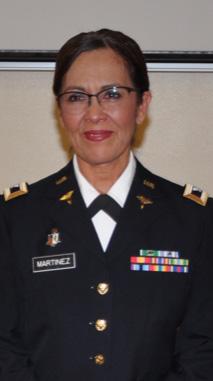

But she didn’t get to enlist fresh out of college like she’d hoped. With a young child at home and a family with reservations about her leaving, her dreams would have to wait. After a decade of perseverance and building on the reliable education she received from UNM, she eventually got to call her family with a proud smile on her face and head off to basic training.
“Without the expectations expressed upon me during my time with the College of Nursing, I wouldn’t have been as determined to accomplish my goals,” she says. “I truly believe their versatile curriculum gives students what they need to be brave leaders.”
And a brave leader she would need to be for what her unique career would bring. From combatting the Covid-19 pandemic in Europe to emergency relief around
the globe, Martinez has aided communities from Poland to Louisiana and many in between.
When she first arrived in Poland, Martinez’s abilities were immediately put to the test. Not only was she in a new place where the culture was unfamiliar to her, she didn’t speak the language of the emergency responders she was working with.
“It was more than just culture shock. It was professional shock,” she says. “I’m glad I was prepared because I had to trust myself. I couldn’t always ask members of my care team how the soldiers were, so interpreters became regular team members when treating patients.”
Not only does Martinez find herself in the field treating soldiers on an international scale, her responsibilities extend to clerical duties that ensure military rankings, credentials and licensures are in check.
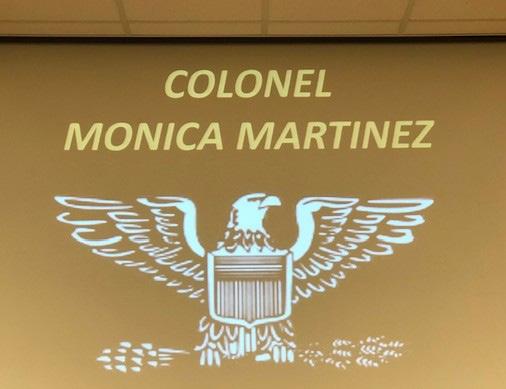
“In the military things are strict and structured,” she says. “There are duties and responsibilities I share with civilian nurses, and then some you would never see in the private sector. It’s a unique world.”
Her multidisciplinary role both advances her career and facilitates the leadership and training necessary to prepare soldiers for whatever may come.

“Innovative readiness training IRT is a part of my job I love, especially. It allows soldiers to do war time skills on real people.” Martinez comments.
Her IRT impact encompasses overseeing and commanding soldiers as they treat real injuries on real people for 10-day sessions. The three-fold nature of her command – field work, credentialing and precepting IRT – acts as a refreshing, rotating door of activity and responsibility.


The UNM College of Nursing faculty are dedicated to improving health and health equity in our communities.

Our programs consistently rank among the best in the country and the top in New Mexico according to U.S. News & World Report’s 2022 edition of America’s Best Graduate & Undergraduate Schools.
Proud? Absolutely. We are proud to serve the people of New Mexico. As part of our mission, we create opportunities for our students.
Join us as they share their scholarship and research with you.
For more information on upcoming presentations or to watch recordings of our previous lectures visit: goto.unm.edu/speaker-series
The series is hosted by the Office of Advancement in partnership with Associate Dean for Research and Scholarship.
All sessions are virtual and CEs are provided to those who attend the presentation.
The Offices of Academic Success and Strategic and Enrollment Services at the UNM College of Nursing have experienced radical change and growth so as to better aid students on their journey from being accepted into the College to graduation. Now, more than ever, the College is equipped to provide supplemental academic support to students, connect them with resources that will help them inside and outside of school, direct funds to students most in need and build lasting community relationships for recruitment efforts.
Aaron Rodriguez, MBA, director of Academic Success says, “We have an array of resources for students that can help in very specific ways. From providing information on time management strategies, connecting students with specific faculty members to helping them ensure they have proper classroom/ clinical accommodations and campus accessibility, our team is dedicated to making sure students are set up to succeed.”
The Office of Academic Success works consistently to utilize resources offered by the College and immersed in the community to help students feel secure in their educational and personal lives. Such expansive efforts reflect the dedication of the College to its students, not just in the classroom or in the clinic, but to their entire wellbeing.
The Enrollment Services team has the responsibility of handling recruitment and admissions, academic advising and financial aid and scholarships. Students start their nursing school journey before they are accepted to the College with the admissions and recruitment team and then are supported by academic advising and financial aid once admitted to help them succeed in their nursing program. They have increased the College’s relationships with local hospitals, clinical sites, high schools and dynamic partners and donors as well as contributed positively to the diversification of College of Nursing office environments.
“We have proactively increased the diversity of our offices by 37%. We want to make sure those who help our students properly represent our student population. Diversity needs to be a part of all aspects of the College, from students and faculty to staff, admin and leadership. We are consciously pursuing positive representation,” states Jeffery Dubinski-Neessen, EdM, director of Strategic & Enrollment Services.
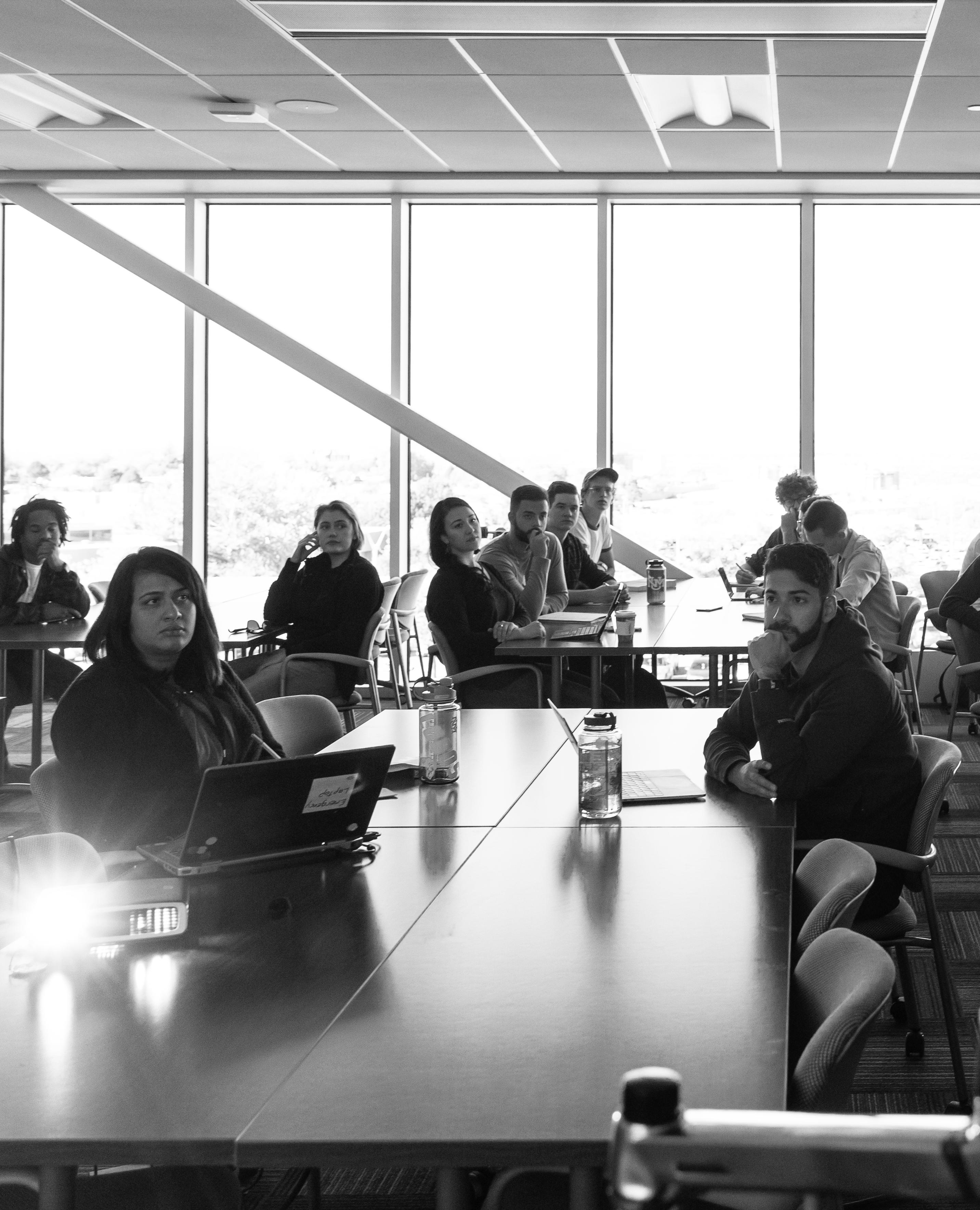
The College continues its efforts to create caring environments, support current student successes and future student bodies. It is due to theses offices’ efforts and proactive initiatives that our students have access to the helpful staff, college resources and community resources needed to help them reach their goals and thrive during their nursing education.
$2.6 MILLION OVER A FOUR-YEAR PERIOD (JULY 2023-JUNE 2027), DEPENDENT ON FUNDING FLUCTUATIONS EACH YEAR, APPROXIMATELY 22 PRIMARY CARE AND NURSEMIDWIFERY STUDENTS WILL RECEIVE UP TO $20,000 EACH IN SCHOLARSHIPS
With collaboration from College of Nursing leadership, faculty and staff, Christine Cogil, DNP, MPS, RN, FNP-BC, has been awarded the U.S. Health Resources & Services Administration for Advanced Nursing Education Workforce (ANEW) grant. The purpose of the ANEW Program is to increase the number of primary care nurse practitioners and certified nurse midwives trained and prepared to provide primary care services in rural and underserved clinics including, mental health and substance use disorder care and/or maternal health care.
BARBARA DAMRON, PHD, MSN, RN, FAAN, HPAC , WAS SELECTED AS A NEW HEALTH POLICY ADVISORY COUNCIL MEMBER BY AACN.
SARA DAYKIN, DNP, RN, CPEN, TCRN WAS SELECTED TO SERVE ON THE NEW MEXICO DEPARTMENT OF HEALTH NURSING EDUCATION ADVISORY COUNCIL (NEAC).
ELIZABETH DICKSON, PHD, RN, WAS AWARDED THE BETTY IRENE MOORE FELLOWSHIP FOR NURSE LEADERS AND INNOVATORS FROM UC DAVIS.
KATIE KIVLIGHAN, PHD, MS, RN, CNM, RECEIVED THE AMERICAN COLLEGE OF NURSE MIDWIVES EXCELLENCE IN TEACHING AWARD.
STEPHEN HERNANDEZ, PHD, RN, HAS BEEN NAMED A FELLOW OF THE AMERICAN ACADEMY OF NURSING.
RACHEL MARZEC, DNP, RN, FNP-BC, PMHNP-BC, RECEIVED AN ICARE AWARD FROM A PATIENT WHO FELT THAT THEY RECEIVED EXCEPTIONAL CARE.
KRISTEN OSTREM-NIEMCEWICZ, DNP, RN, CNM, FNP-BC, FACNM, WAS SELECTED TO SERVE ON THE PRACTICE-READY ADVISORY GROUP FOR THE AMERICAN ASSOCIATION OF COLLEGES OF NURSING (AACN).
HEIDI ROGERS, DNP, RN, FNP-BC, APHN-BC, WAS INDUCTED AS A NATIONAL ACADEMIES OF PRACTICE FELLOW.
VAN ROPER, PHD, FNP, FNP-C, FAAN, HAS BEEN INDUCTED AS A FELLOW FOR THE AMERICAN ASSOCIATION OF NURSE PRACTITIONERS.
SHARON RUYAK, PHD, RN, CNM, HAS BEEN NAMED WITH THE LEAH L. ALBERS PROFESSORSHIP IN MIDWIFERY.
TAMARA SHANNON, DNP, RN, CPNP-PC, WAS AWARDED THE 2023 LOUIE AWARD FOR AN EXTRAORDINARY UNM FACULTY MEMBER.
KATHERINE ZYCHOWSKI, PHD, WAS NAMED TO THE TERRY AND ALYCE RICHARDSON PROFESSORSHIP IN NURSING.
AMANDA ABEYTA-REY
COORD, SPECIAL EVENTS
GUINEVERE BEARD
ACADEMIC ADVISOR, SR.
BRANDY BENNETT
ADMISSIONS ASSOCIATE
EMILY CHELLGREN
STUDENT RECRUITMENT SPECIALIST
CONNAR DIXSON
HS RESEARCH TECH 1
NATALIA GARCIA REYES
LEARNING SPECIALIST
BERNARDINO MANUEL GRIEGO
PROGRAM COORDINATOR
STEPHANIE GURULE
INSTRUCTIONAL MEDIA SPECIALIST
MONICA HERRERA
PROGRAM COORDINATOR
MOISES IBARRA
OPERATIONS MANAGER - ADMISSIONS
VAN ROPER, PHD, RN, FNP-C, FAAN ASSISTANT DEAN OF CLINICAL AFFAIRS & CLINICAL EDUCATOR, ASSOCIATE PROFESSOR
KRISTEN OSTREM-NIEMCEWICZ, DNP, RN, CNM, FNP-BC, FACNM INTERIM ASSOCIATE DEAN OF ACADEMIC AFFAIRS & CLINICAL EDUCATOR, ASSOCIATE PROFESSOR
GERALDINE GUERRA-SANDOVAL, MSN, RN, CMSRN SENIOR LECTURER
MINDY TINKLE, PHD, RN, WHNP-BC, FAAN ASSISTANT DEAN OF UNDERGRADUATE EDUCATION, ASSOCIATE PROFESSOR
CASSANDRA FIGGS, MSN, RN, CEN LECTURER I
GRACE MURPHY, MSN, MPH, RN LECTURER I
MELISSA LEHAN MACKIN, PHD, RN
TENURE TRACK, ASSOCIATE PROFESSOR
SASHA POOL, PHD, RN
ACCELERATED SECOND-DEGREE BSN PROGRAM DIRECTOR, CLINICIAN EDUCATOR, ASSISTANT PROFESSOR
GINA ROWE, PPHD, DNP, MPH, RN, FNP-BC, BC-ADM, PHCNS, FNAP ASSISTANT DEAN OF PROFESSIONAL GRADUATE PROGRAM & CLINICAL EDUCATOR, ASSOCIATE PROFESSOR
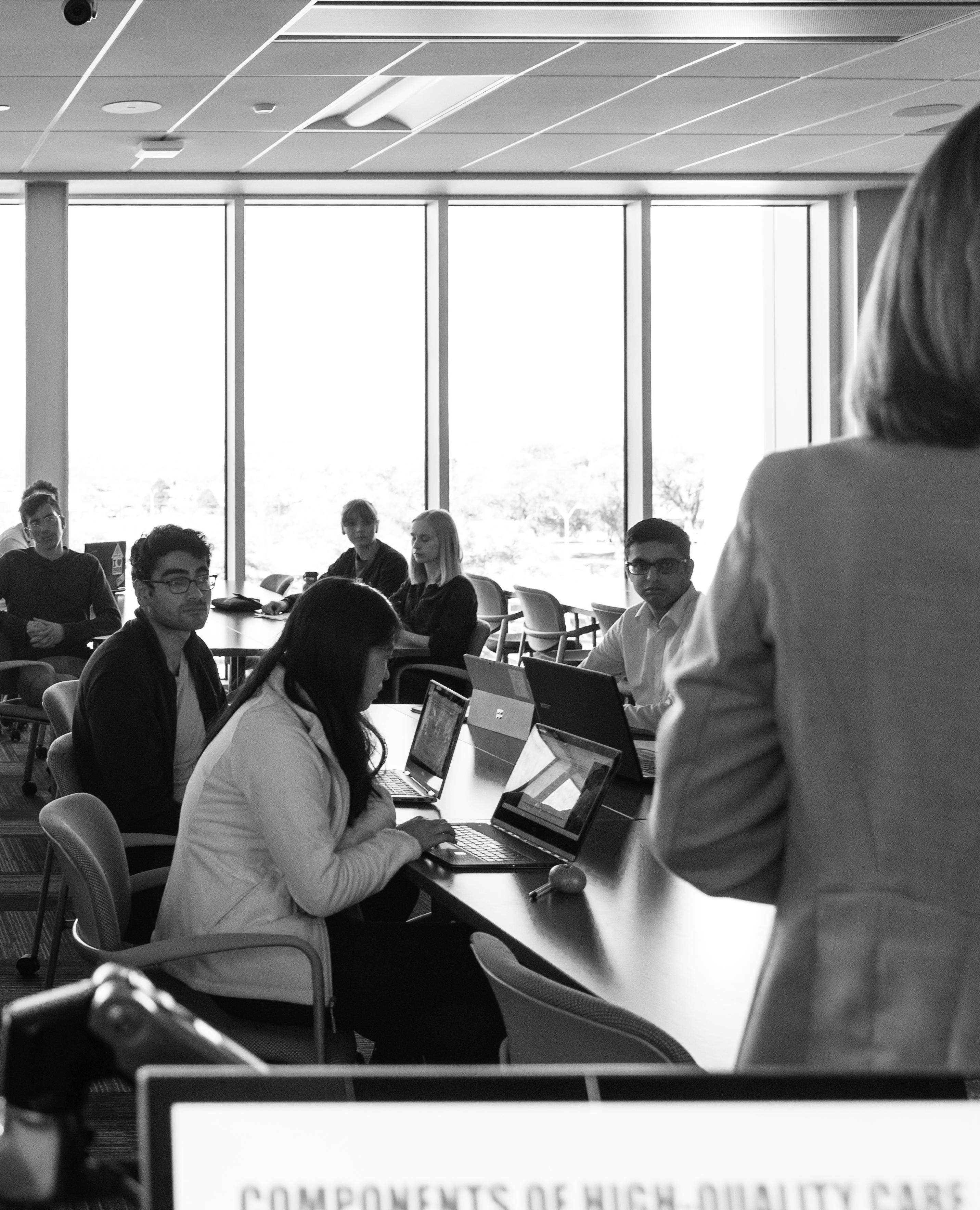
CONNIE SMITH-FASSIER, DNP, MHA, RN, CNML
CLINICIAN EDUCATOR, ASSISTANT PROFESSOR
REVATHI SUBRAMANIAN, PHD, MSN, RN
CLINICAL EDUCATOR, ASSOCIATE PROFESSOR
EMORY TAYLOR, MSN, RN, CCRN-K
LECTURER I
MINDY TINKLE, PHD, RN, WHNP-BC, FAAN ASSOCIATE PROFESSOR
CHRISTINA VIGIL, MSN-ED, RN, WCC, OMS, CWCN LECTURER I
VICTORIA YU, DNP, JD, RN RN TO BSN PROGRAM DIRECTOR, CLINICIAN EDUCATOR, ASSISTANT PROFESSOR
NITA KELLY ACADEMIC ADVISOR
MELISSA LAVERS
PROGRAM SPECIALIST
KAREN LERNING SR. FISCAL SERVICES TECH
DEYANIRA NUNEZ
LEARNING SPECIALIST
MARCELO OLGUIN
HUMAN RESOURCE TECHNICIAN
TREVOR ORTEGA
IT SUPPORT TECH 1
LILY OUELETT
NURSE EDUCATOR - CLINICAL
LESLIE PETERS
NURSE EDUCATOR - CLINICAL
MICHAEL RIBLETT
TECHNICAL ANALYST 3
AARON RODRIGUEZ
DIRECTOR OF ACADEMIC SUCCESS
ADILENE RUIZ-OLIVAS
ACADEMIC ADVISOR, SR.
KRISTOPHER SAMORA
OPERATIONS MANAGER - FINANCIAL AID
STEPHANIE SARGENT-SHEARIN ADMINISTRATIVE COORDINATOR
KAYLEEN SCHENK
TECHNICAL EDITOR
ANDREW SCHNEIDER
INSTRUCTIONAL MEDIA SPECIALIST
FALKO SCHOENEWEISS
NURSE EDUCATOR - SIMULATION
ANGELICA TAFOYA
ACADEMIC ADVISOR, SR.
DANIELLE TRUJILO
NURSE EDUCATOR - CLINICAL
GRACE WIELE
STUDENT RECRUITMENT SPECIALIST
SARAH WILLIAMS
ADMINISTRATIVE ASSISTANT
We would like to extend a warm and well-deserved congratulations to our retirees this year. The College of Nursing will feel your absence but we are eternally grateful for the long hours of service, wealth of wisdom and memories you have imparted during your time here. Thank you for your dedication to nursing practice, education and advancement.
CHRISTINE DELUCAS, DNP, MPH, RN, NEA-BC ASSOCIATE PROFESSOR
Christine Delucas joined the College of Nursing in 2014. During her time she served as the director for the Doctor of Nursing Practice program, on the Graduate and
Curriculum Committee and as chair of the Program Evaluation Committee. She also chaired the UNM Faculty Senate Curricula Committee. Prior to joining UNM, she had retired from the U.S. Air Force and Air Force Reserves. She earned the Air Force Meritorious Service Medal, having served in both war and peacetime circumstances. Delucas graduated with a Doctor of Nursing Practice degree from the University of San Francisco in 2013 and a master’s in public health from the University of Washington in 1985.
AMY LEVI, PHD, RN, CNM, WHCNP, FAAN, FACNM VICE PRESIDENT OF HSC ACADEMIC AFFAIRS, PROFESSOR AND LEAH
L. ALBERS ENDOWED PROFESSOR OF MIDWIFERY
Prior to her appointment as vice president and a faculty member, Amy Levi served as director of interprofessional education for the UNM Health Sciences Center. She was also the program director of the Nurse-Midwifery Education program at the University of California San Francisco and the director of midwifery clinical services at the University of Vermont and University of Pennsylvania. Her research and professional interests encompassed safe motherhood, unintended pregnancy management and midwifery education.
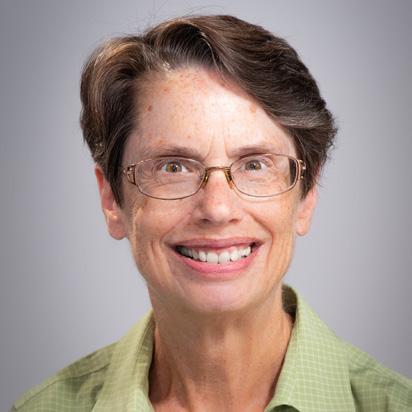
RACHEL MARZEC, DNP, RN, FNP-BC, PMHNP-BC ASSISTANT PROFESSOR
Rachel Marzec has been practicing as a registered nurse for approximately 40 years. Her experience has been primarily in providing care to underserved populations. Since 2002, she has been board certified to practice as a family nurse practitioner and psychiatric-mental health nurse practitioner. She currently provides medical and behavioral health services to adults and
children. Marzec received her Doctor of Nursing Practice from Drexel University; a Post-Master’s Certificate and a Master of Science in Nursing - with concentrations in psychiatric mental health nurse practitioner and family nurse practitioner - from Oregon Health & Sciences University and a Bachelor of Science in Nursing from The University of New Mexico.
Debra Smith was on the faculty at the College of Nursing beginning in 1995. For many years, Smith’s teaching experience focused on undergraduate students in the classroom, laboratory and
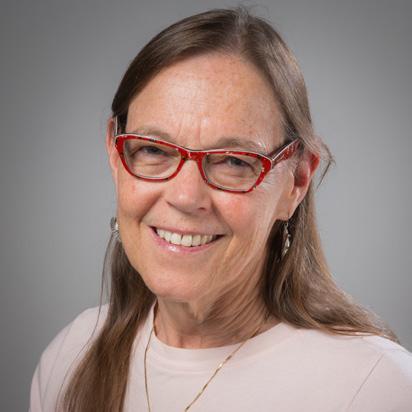
clinical settings. Towards the end of her tenure, her focus was on online teaching with the Registered Nurse-to-Bachelor of Science in Nursing (RN to BSN) students. Her clinical experience was primarily in adult critical care settings. She has provided concept-based curriculum consultations to nursing schools across the country. Smith earned her Master of Science in Nursing degree in 1995 and her Bachelor of Science in Nursing degree in 1985, both from UNM.
 DEBBY SMITH, MSN, RN, CNE PRINCIPAL LECTURER II
DEBBY SMITH, MSN, RN, CNE PRINCIPAL LECTURER II
The UNM College of Nursing lost two amazing faculty members this year. Their time with us was too brief but their impacts were enormous. Their passion, dedication and memories will forever live on in the students they taught, the faculty and staff they worked along side with and in the hearts of everyone they knew.
LAURA VANYO, MSN, RN PRINCIPAL LECTURER IWith a clinical background in parent-child nursing, Laura Vanyo taught undergraduate nursing students in class, laboratories and clinical placements for over 25 years. She had certifications in in-patient obstetrics and Lamaze childbirth education. She participated in the New Mexico Nursing Education Consortium, as well. When the consortium learned of her passing they posted, “This is sad news for all of us throughout NMNEC that had the pleasure of working with Laura Vanyo and being gifted with her beautiful smile, no matter how stressful things were.” More than anything Vanyo was a teacher at heart. She passed along her valuable wisdom to all of her students. Vanyo received her Master of Science in Nursing, with a focus on parent-child nursing, from the University of Texas at El Paso; a Bachelor of Science in Nursing from Arizona State and a Bachelor of Science from Western Washington University.
MELISSA COLE, DNP, MSW, RN-BC, NEA-BC, FACHE DNP NURSE EXECUTIVE ORGANIZATIONAL LEADERSHIP CONCENTRATION COORDINATOR, NURSING ADMINISTRATION CONCENTRATION COORDINATOR AND ASSISTANT PROFESSOR
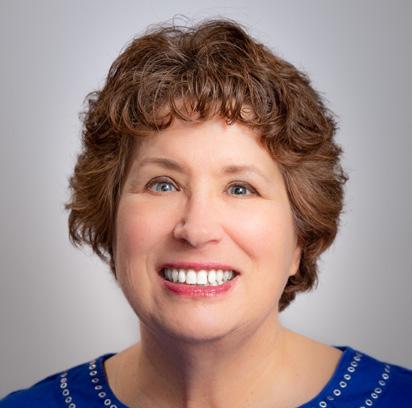
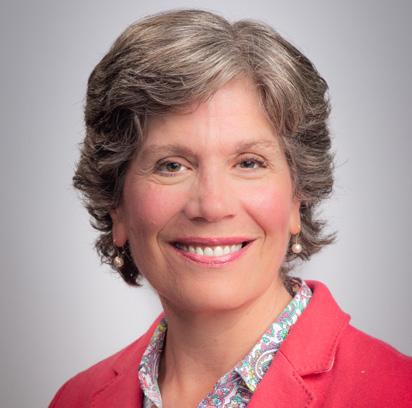
Melissa Cole worked primarily in leadership positions across her 35 years in nursing, specializing in psychiatric nursing, quality, change management and consulting. She held national certifications in informatics nursing, advanced nurse executive and is a board certified health care executive. Prior to joining faculty at the College of Nursing, Cole worked at Siemens and
The Advisory Board Company, traveling the country implementing evidenced-based practice. She held leadership positions at the University of New Mexico Hospital as director of ophthalmology clinics and surgical specialty clinics. She was also a unit based educator in adult behavioral health. Cole developed and taught ethics in health care management for the master in administration program at UNM. She believed ethical leadership positively affects patient and staff outcomes. Cole was a compassionate educator, always advocating for her students. Many of the students credit Cole with being instrumental to finishing their degree. In her final semester of teaching she graduated the largest cohort of DNP students in the College’s history.
CAROLYN MONTOYA, class of 1976 and 2013, is serving as Interim Dean for the UNM College of Nursing.
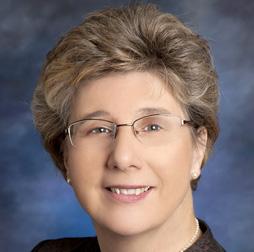
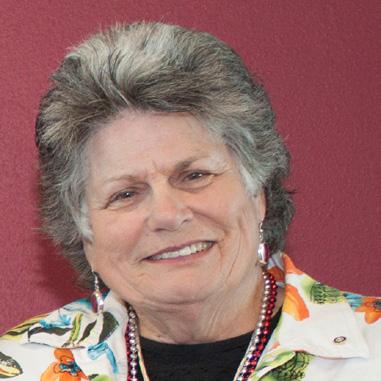
College of Nursing Class of 1973 alumnae celebrated their 50th graduation anniversary.
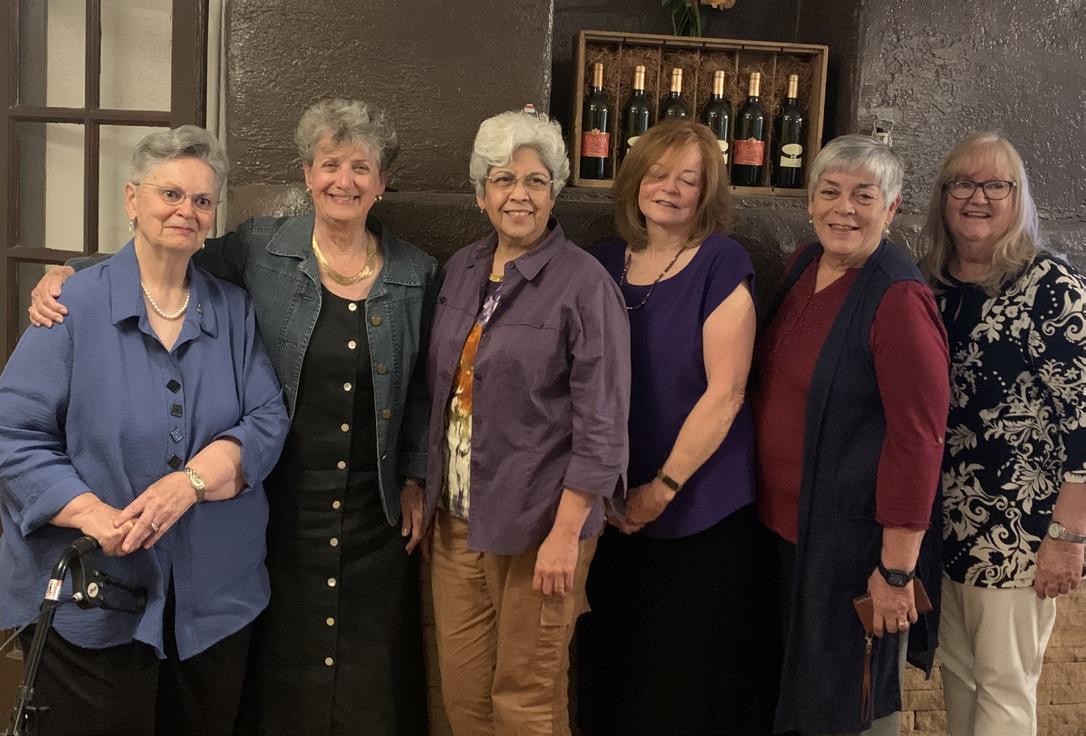
SANDRA DODGE, class of 1979 and 1986, was the recipient of the 2022 Distinguished Alumni Award from the UNM College of Nursing.

SUSAN FOX, class of 1971, was named a member of the Hummingbird Circle by the New Mexico Center for Nursing Excellence.

JAMIE SILVA-STEEL, class of 1986 and CEO of Sandoval Regional Medical Center, participated in a panel of nursing professionals hosted by The Economic Forum of Albuquerque to inform business leaders in New Mexico about the importance of the nursing profession and the role nurses play in the economy. She was also awarded the New Mexico Nursing Excellence Award in Nurse Executive Leadership by the New Mexico Center for Nursing Excellence.
TERRY L. FUHS, class of 1990 and 2009, was named a New Mexico Nursing Legend by the New Mexico Center for Nursing Excellence.
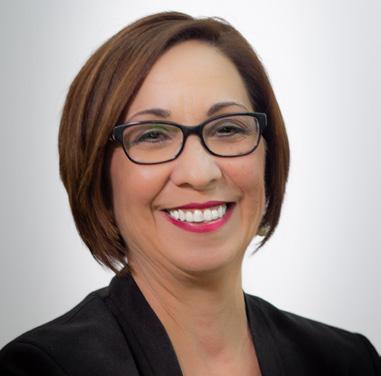
MOLLY FAULKNER, class of 2002, 2013 and 2022, was featured for Nurses Week in a UNM Health Sciences story.
PATRICIA HURST, class of 1991, was named a member of the Hummingbird Circle by the New Mexico Center for Nursing Excellence.
NICOLLE GONZALES, class of 2004 and 2011, presented on Ancestral Innovations at the Crossroads of Providing Maternal Health Care to the UNM College of Nursing Midwifery community. She was also recognized by the UNM Alumni Native American Chapter and was presented with its inaugural award.

JAN MARTIN, class of 2009, was awarded the New Mexico Nursing Excellence Award in Public Health/Community/ School by the New Mexico Center for Nursing Excellence.

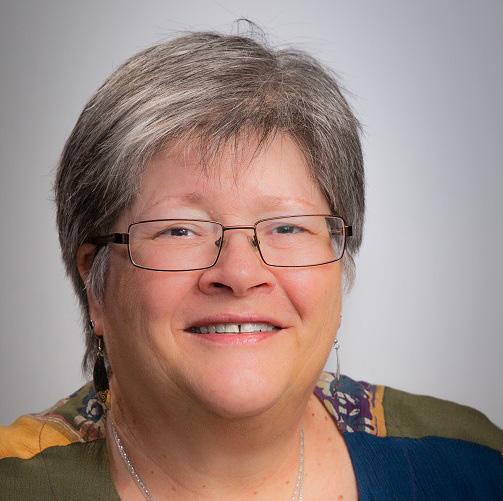
ERIN BEVERLY, class of 2012 and 2015, was the recipient of the 2022 New Alumni Award from the UNM College of Nursing.
IAN CADY, class of 2017, was awarded the New Mexico Nursing Excellence Award in Touch of Life by the New Mexico Center for Nursing Excellence.

KATHY DAVIS, class of 2018, was named a member of the Hummingbird Circle by the New Mexico Center for Nursing Excellence.
DONNA M. DINEYAZHE, class of 2017, was the recipient of the 2022 Outstanding Graduate Preceptor Award from the UNM College of Nursing.
DIANE EVANS-PRIOR, class of 2016 and Dean of School of Nursing & Patient Support at CNM, participated in a panel of nursing professionals hosted by The Economic Forum of Albuquerque to inform business leaders in New Mexico about the importance of the nursing profession and the role nurses play in the economy.
RACHAEL FRIJA, class of 2019 and Board President of NM Nurses Association, participated in a panel of nursing professionals hosted by The Economic Forum of Albuquerque to inform business leaders in New Mexico about the importance of the nursing profession and the role nurses play in the economy.
LORAANN LOVATO, class of 2011 and 2022, was awarded the New Mexico Nursing Excellence Award in Critical Care by the New Mexico Center for Nursing Excellence.

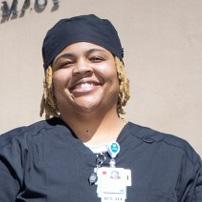
We want to hear from you. Tell us what you are doing, share your stories and promotions.
Tag
.
SMITA RASHID, class of 2008, was the recipient of the 2022 DAISY Award for Extraordinary Nursing Faculty from the UNM College of Nursing.
KALISSA MORGAN, class of 2022, was elected President of the NM ACNM Affiliate.
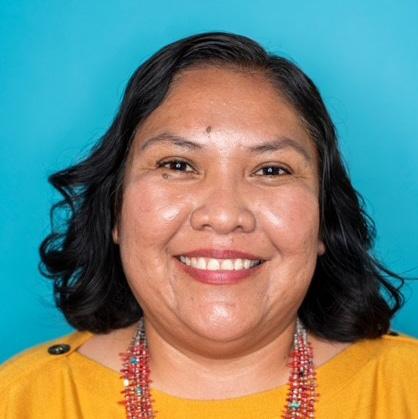
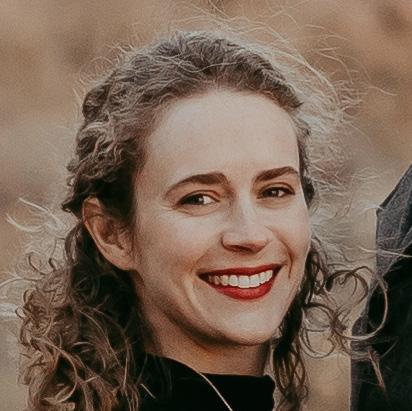
KARL NGOYE, class of 2018, was awarded the New Mexico Nursing Excellence Award in Community Service by the New Mexico Center for Nursing Excellence.
SOPHIA SAGERT, class of 2022, was featured for Nurses Week in a UNM Health Sciences story.
OUR FACULTY, STAFF AND ASPIRING LOBO NURSES WILL HAVE PLENTY OF SPACE AND THE LATEST TECHNOLOGY TO LEARN, PRACTICE AND RESEARCH. WHERE? IN THE NEW 93,740-SQUARE-FOOT COLLEGE OF NURSING AND PUBLIC HEALTH EXCELLENCE BUILDING. SHARE IN THE EXCITEMENT AND PROGRESS OF OUR FUTURE!
